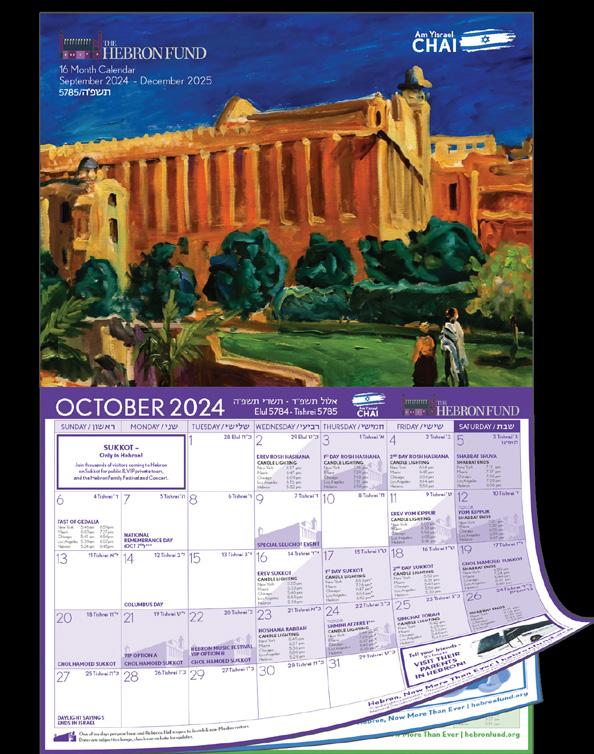AUGUST 24TH
Avot Chapter 5
Davening and Putting on Tefillin after Passing the Date Line
Rabbi Daniel Mann Page 54
OU Parenting Column
Michal Silverstein Page 56


AUGUST 24TH
Avot Chapter 5
Davening and Putting on Tefillin after Passing the Date Line
Rabbi Daniel Mann Page 54
OU Parenting Column
Michal Silverstein Page 56

Dear OU Parenting,
Following the recent string of terrorist attacks, my son, 11, has become veryanxious. I, ofcourse, have also been affected by all the loss and trauma. I’m not sure how much or how little to share with him in general and specifically regarding my own emotional experience. For example, should I try not to cry and be sad around him? T.R.


Michal Silverstein, MS
Dear T.R.
Thank you for asking this very relevant and timely question.
Adults as well as children are overwhelmed with emotions when they hear about a terrorist attack. When they become more frequent, the feeling of uncertainty and loss of control can create much anxiety. There are certain guidelines to keep in mind


when responding to children under circumstances.
Firstly, it’s important to give children space to speak, meaning a space to them selves in the way that is natural them. Some children don’t have much reaction and others will cry, show anger frustration. They may say things that don’t agree with or challenge you. them the space to do this is crucial.
Next, when they ask questions, try them accurate information, answering the questions they ask. Stay focused. necessary to elaborate or get sidetracked politics or other similar situations. Explana tions should be given in an age appropriate manner. Just like your rules are age priate your discussions should be Having more detailed, graphic conversations is more appropriate with an 18 than a old.


It’s important to keep an eye out emotional and physical signs of If your child looks sad, has crying becomes fearful or angry or is experienc ing changes in sleeping and eating patterns, he may need extra help processing rent state of events. Be aware of behavioral changes.
Regarding your own emotional state,
Rabbi
Rabbi
Rabbi

The Pomegranate Jew and the Date Jew
and Putting on Tefillin
Passing the Date Line Rabbi Daniel Mann
4 Teens by Teens
& Caroline Pudell
Torah Tidbits is proud to share a photo each week on the cover from our readers! It is an honor to showcase the immense talent from across the country.
us your best photos and give us the opportunity to highlight your story.

is invited to submit! (amateurs and professionals alike) Please email to aarong@ouisrael.org

Photographed by Rabbi Dr. David Mescheloff. This is a picture of an olive tree in our yard in Moshav Hemed that I planted myself about 45 years ago. It was just a stick that had begun to grow from a seed, that was under a tank of heating kerosene that stood on legs outside our house, to feed our heater inside. When the “stick” reached the bottom of the tank, it began to grow sideways! So I moved it to where it is now, and it has flourished. A few years ago, grandchildren picked over fifty kilos of olives from the tree, and we had
Yerushalayim/Maale Adumim
Aza Area (Netivot, Sderot
6:37
Ranges 11 days Wed–Shabbat
Mond/Herzliya/K.Saba
Tikva
Shomron
Haifa / Zichron
Gush Shiloh
Tel Aviv / Givat Shmuel
Givat Zeev
Tzfat / Bikat HaYarden 7:41 5:44 6:44 7:50 5:51 6:53 Golan 7:44 5:46 6:46 7:53 5:53 6:54
Afula
Nahariya/Maalot 7:42 5:45 6:45 7:51 5:52 6:54
Rabbeinu Tam (Jerusalem): Eikev 8:29 PM • Re’eh 8:21 PM
All Times According to MyZmanim (20 mins before Sunset in most Cities; 40 mins in Yerushalyim and Petach Tikva; 30 mins in Tzfat and Haifa)
All Times According to MyZmanim (20 mins before Sunset in most Cities; 40 mins in Yerushalyim and Petach Tikva; 30 mins in Tzfat and Haifa)
OU Kashrut NCSY Jewish Action JLIC NJCD / Yachad / Our Way OU West Coast OU Press Synagogue/Community Services OU Advocacy OU Israel
MITCHEL R. AEDER, PRESIDENT OF THE ORTHODOX UNION Yehuda Neuberger, Chairman of the Board, Orthodox Union | Dr. Josh Penn, OU Kashrus Commission
RABBI MOSHE HAUER, EXECUTIVE VICE PRESIDENT | RABBI JOSHUA M. JOSEPH, ED.D. EXECUTIVE VICE PRESIDENT & CHIEF OPERATING OFFICER Rabbi Dr. Tzvi Hersh Weinreb, Exec. V.P. Emeritus OU KOSHER: Rabbi Menachem Genack, CEO/Rabbinic Administrator OU Kosher | Rabbi Moshe Elefant, COO/Executive Rabbinic Coordinator ISRAEL: Rabbi Yissachar Dov Krakowski, Rabbinic Administrator | Rabbi Ezra Friedman, The Gustave and Carol Jacobs Center for Kashrut Education/ Deputy Rabbinic Administrator Headquarters: 40 Rector St. 4th floor, New York, NY 10006 212-563-4000 website: www.ou.org
Editor Emeritus: Phil Chernofsky
Editor: Rabbi Aaron Goldscheider | aarong@ouisrael.org
Advertising: Ita Rochel | 02-5609125 or ttads@ouisrael.org
Website: www.torahtidbits.com
Not getting enough TTs? Too many? None at all? Contact our DISTRIBUTION 050-577-2111 • ttdist@ouisrael.org
Ranges 11 days Wednesday–Shabbat Aug. 21 - 31 / 17 - 27 Av
Oct x–x / x–x Cheshvan
Earliest Tallit and Tefillin x:xx–x:xx
Sunrise x:xx–x:xx
Earliest Tallit and Tefillin 5:15–5:22 Sunrise 6:08–6:14
Sof Zman Kriat Shema
Magen Avraham
Sof Zman Tefila
(According to the Gra and Baal HaTanya)
Sof Zman Kriat Shema 9:25–9:26 Magen Avraham 8:46–8:49 Sof Zman Tefila 10:30 (According to the Gra and Baal HaTanya)
Chatzot (Halachic Noon)
Chatzot (Halachic Noon) 12:41–12:39
Mincha Gedola (Earliest Mincha)
Mincha Gedola (Earliest Mincha) 1:14–1:11
Plag Mincha
Plag Mincha 5:53–5:43
Sunset (Including Elevation)
Sunset (Including Elevation) 7:20–7:08
Seymour J. Abrams • Orthodox Union Jerusalem World Center • Avrom Silver Jerusalem College for Adults • Wolinetz Family Shul • Makom BaLev • Birthright • Yachad • NCSY in Israel • JLIC in Israel • Camp Dror • Pearl & Harold M. Jacobs ZULA Outreach Center • The Jack Gindi Oraita Program • OU Israel Kashrut
STUART HERSHKOWITZ, PRESIDENT OU ISRAEL
Zvi Sand / Yitzchak Fund: Former Presidents, OU Israel | Rabbi Emanuel Quint z”l, Senior Vice President | Prof. Meni Koslowsky, Vice President VAAD MEMBERS:
Michael Elman | Yonatan Frankel | Yitzchak Fund | Daniella Hellerstein | Stuart Hershkowitz | Jeremy Lustman | Meir Raskas | Atara Reichel | Zvi Sand | Norman Schmutter | Mark Schneider | Esther Williams RABBI AVI BERMAN, EXECUTIVE DIRECTOR, OU ISRAEL
David Katz, CFO, OU Israel | Natan Kandler, COO, OU Israel | Chaim Pelzner, Director of Programs, OU Israel | Rabbi Sam Shor, Director of Programs, OU Israel Center | Rabbi Sholom Gold zt"l, Dean, Avrom Silver Jerusalem College for Adults 22 Keren HaYesod <> POB 1441 <> Jerusalem 9101032 phone: (02) 560 9100 | fax: (02) 561-7432 email: office@ouisrael.org website: www.ouisrael.org
Founders and initial benefactors of the OU Israel Center: George and Ilse Falk a"h
Torah Tidbits and many of the projects of OU Israel are assisted by grants from THE JERUSALEM MUNICIPALITY

OU Israel, Torah Tidbits does not endorse the political or halachic positions of its editor, columnists or advertisers, nor guarantee the quality of advertised services or products. Nor do we endorse the kashrut of hotels, restaurants, caterers or food products that are advertised in TT (except, of course, those under OU-Israel hashgacha). Any "promises" made in ads are the sole responsibility of the advertisers and not that of OU Israel, the OU Israel Center , Torah Tidbits.

RABBI AVI BERMAN EXECUTIVE DIRECTOR, OU ISRAEL ABERMAN@OUISRAEL.ORG
Rabbi Avi Berman Executive Director, OU Israel
One of the best parts of my day is going to shul with my 11 year-old son, Mordechai. Davening to Hashem next to my child gives me the sense that not only am I praying for myself, but for all the generations of the Jewish People. On the special occasions when my own father can join us, it deepens this kavannah - three generations davening together, standing under the tallit during Birkat Cohanim, it’s such an important and emotional moment for me.
A few weeks ago, Mordechai asked me if he could wrap up my tefillin in their boxes at the end of davening. I of course said yes, and for the past few weeks, he has been wrapping them every day. I had assumed that he just wanted something to do, a feeling of accomplishment with his father’s tefillin. When I inquired why, day after day, he has been wrapping my tefillin, he looked up at me and said, “Abba, in a year from now, I
In loving memory of our dear Mother, Grandmother & Great Grandmother
will be starting to put on my own tefillin, in preparation for my Bar Mitzvah. I need to prepare before that!” I saw the excitement in his eyes. I saw that he knew it was a full year away, yet he was already looking forward and anticipating the moment he would put on his tefillin for the first time.
When I heard this, it brought me back to when all my other boys started putting on tefillin. I gave them a bracha that the same excitement they feel putting on tefillin the first time should continue with them every time they put on tefillin. It is easy to fall into getting used to an action, for it to become rote and routine. Excitement naturally diminishes over time. It takes serious work and action to keep the mitzvot we do every day exciting and new.
May the Torah learned from this issue be in her merit
Cooki & Howie Maisel, Efrat Lenny & Penny Beer, Cleveland Ester Sara Carroll, Norfolk
There are many moments in life like this, where we think to ourselves, how do I make sure to never forget this feeling, this inspiration, this excitement? I had a moment like this last week, during Tisha B’av, and it happens every year. At the Kotel, as Tisha B’av ebbs away, the OU’s NCSY Kollel summer program comes with their hundreds of high school boys. They form a big circle in the Kotel plaza, and they start singing with tremendous passion. They sing songs of the soul, songs of yearning for the Beit HaMikdash, songs of hope for Mashiach, songs of longing for a built-up Yerushalayim.
I have the tremendous privilege of getting to sit there with them at the hardest time of the fast, and I get to watch them all arm

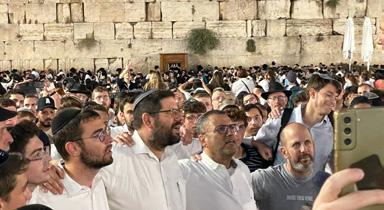
in arm together, close their eyes, and sing their hearts out to HaKadosh Baruch Hu. It’s a very special moment, and I am blessed that a number of my boys joined me for this incredible experience. It is a great honor that every year the mayor of Yerushalayim, Moshe Lion, joins our circle and sits with us. For the mayor of today’s Yerushalayim to be with us in our pain and longing for a Yerushalayim of tomorrow, is very meaningful. This year was particularly moving with representatives from the families of the hostages who joined. The entire tzibur gathered to daven and say Tehilim for all of our hostages to come home safely very soon.
Anyone who has experienced it can say that it is one of the best, most inspiring, experiences of their lives. When you see thousands of Jews around you just looking up and yearning, deeply, for the Beit HaMikdash, praying and hoping that Tisha B’av this year will be
the last, that emotional feeling, is so powerful.
The question is, how do we keep that feeling going? Like doing a mitzvah for the first time, how do we keep it fresh in our minds? We say three times a day, “Ve-techezena eineinu, may our eyes see Your return to Zion in mercy,” how can we mean it as if we were on the floor in front of the Kotel with all of those feelings we felt that day? How can every davening be like that Maariv we said at the Kotel at the conclusion of Tisha B’av?
Our Director of Social Media, Nina Broder, took an amazing video of the crowd from one of the buildings overlooking the plaza. You can see the OU and NCSY Kollel summer camps sitting in the inner circle, and then masses of people sitting and standing around them, and everyone is singing. When she sent me the video, I was instantly brought back to that moment. I realized that this is one of the many reasons why Hashem gave us this technology today. We can capture moments and later, in a small way, relive those feelings we felt.
As I wrote in these pages a few weeks ago, I had the merit to help produce a video for Tisha B’av with my amazing staff, Laya Bejell, Nina Broder, Shayna Bacharach, as well as tremendous videographer Zeev Schwartz. They all worked tirelessly with me on making this incredibly powerful video, “Mashiach, We Are Ready.” (Scan the QR code here to watch the video or visit our YouTube channel.) As I sit here in my office writing this message, I
am looking at how many views the video has gotten on YouTube, and it is fascinating to see that it has reached over 80,000 views. This tells me that there is a tremendous yearning to feel, to experience, the loss and the longing for the Beit HaMikdash, and for Mashiach to come. I’ve also received such amazing feedback from Jews of all different backgrounds who shared that they got so much from watching it on Tisha B’av. People have sent me videos of their children mesmerized by watching the screen, rabbis in North America have told me they showed the video before reading Eicha in shul.
It tells me that people want to feel. They want to experience. They are looking at our Father in Heaven and are saying, “HaKadosh Baruch Hu, we miss the Beit HaMikdash. And while we never experienced it, we are watching videos to help us feel it, to want it.” This technology has the capacity to help us feel, to enter a moment, to experience it. And sometimes, to “relive” an experience we never had. Combine this with the crowd of almost 400 people who joined us at Torah Efrat in loving memory of David & Norma Fund z”l by their children, to prepare for Tisha B’av. We are beginning to see that people are showing Hashem more and more how they truly want Mashiach to come, how they are desperately in need for better times, for a rebuilt Yerushalayim and a better world.
I want to thank all those who gave us feedback, for the video, Torah Efrat, and the incredible singing we had at the Kotel, and I look forward to meeting you all at the Beit HaMikdash with Hashem’s help, very soon. Let us keep these feelings going, watching videos, having inspiring experiences, and reminding ourselves of what could be
bimheira biyameinu. We sing, “Im eshkachech Yerushalayim, tishkach yemini.” Let us never forget Yerushalayim, and allow it to be part of our lives and in our hearts.
Wishing you all an uplifting and inspiring Shabbat,

Rabbi Avi Berman Executive Director, OU Israel aberman@ouisrael.org
















Keren Malki
Honoring the memory of Malka Chana Roth ד”יה 1985-2001, killed in the Sbarro bombing.


OU EXECUTIVE VICE PRESIDENT
Unconditional love. We know what that means when it comes to our relationships with family members and friends. What does it mean when it comes to our love for Hashem?
According to the Mishna (Brachos 54a), unconditional love of God is the mandate of the first paragraph of the Shema, “v’ahavta eit Hashem Elokecha b’chol l’vavcha uv’chol nafsh’cha uv’chol m’odecha. You shall love Hashem your God with all your heart, with all your soul, and no matter how He treats you.” We must love God even if He does not appear to be showering us with gifts. Unconditional love of God results in faith that weathers profound challenges.
Shema’s second paragraph – included in this week’s Parsha - seems to tell a very different story. Here we are informed of the rewards for following G-d and the dire consequences of abandoning His ways. It is as if we are expected to follow Him conditionally, mindful of the resultant benefits. Notably, that paragraph speaks of serving G-d “b’chol l’vav’chem uv’chol nafsh’chem, with all of your hearts and all of your souls,” omitting
the third category of “b’chol me’odchem, no matter how He treats you.” This is logical as it would be incongruous to encourage following Him “no matter what” alongside an elaborate description of the rewards coming to the faithful.
There is another notable change in the second paragraph, the introduction of a reference to prayer, “l’ovdo b’chol l’vavchem,” is interpreted by the Gemara to refer to prayer. Eizehu avodah sheb’lev zu tefilla.(Taanis 2a). Prayer may be omitted from the first paragraph of Shema because – as the Talmud ) Shabbos 10a) notes - prayer addresses temporal needs, chayei sha’ah concerning itself with plentiful rains and other worldly matters. Those are the issues addressed in Shema’s second paragraph, while the first focuses exclusively on the transcendent, constant, and immortal pursuit of Torah study, what the Talmud (ibid) describes as chayei olam. In that world of unconditional love of God, where whatever He gives us is just fine, there may be no need or place for us to pray for anything to be different (see Ein Ayah, Shabbat, 43).
There is, however, an aspect of tefilla that is the ultimate expression of unconditional love. Our prayers open with praise of God, continue to our requests, and conclude with expressing gratitude. That gratitude
is unconditional. It is not gratitude for the current request having been granted; that remains to be seen. It is an expression of appreciation for the privilege of every day of life and for the inherent gift of life. Indeed, when that Mishna (Brachos 54a) teaches about loving G-d no matter what, it tells us b’chol midah umidah she’hu moded lecha hevei modeh lo, “no matter what He gives you, express your gratitude to Him.”
It is a high bar, perhaps impossibly high. Aaron Hakohein accepted the tragic loss of his sons in silence. Moshe was instructed to be silent - shtok! when he was shown what would be the torturous death of Rabbi Akiva (Menachos 29b). Only Rabbi Akiva went beyond that, not just accepting his fate in silence but loudly expressing and affirming it as the ultimate expression of his love of G-d (Brachos 61b).
That is what unconditional love of God looks like. Modim anachnu loch.

Discover Beautiful Wooden Judaica find your style www.etz-ron.com



has become one of the in Israel... Gaza no longer a threat Far from Lebanon and the Houtis... Far from Judea and Samaria... Only in the city’s ...
places Chinese workers many new projects





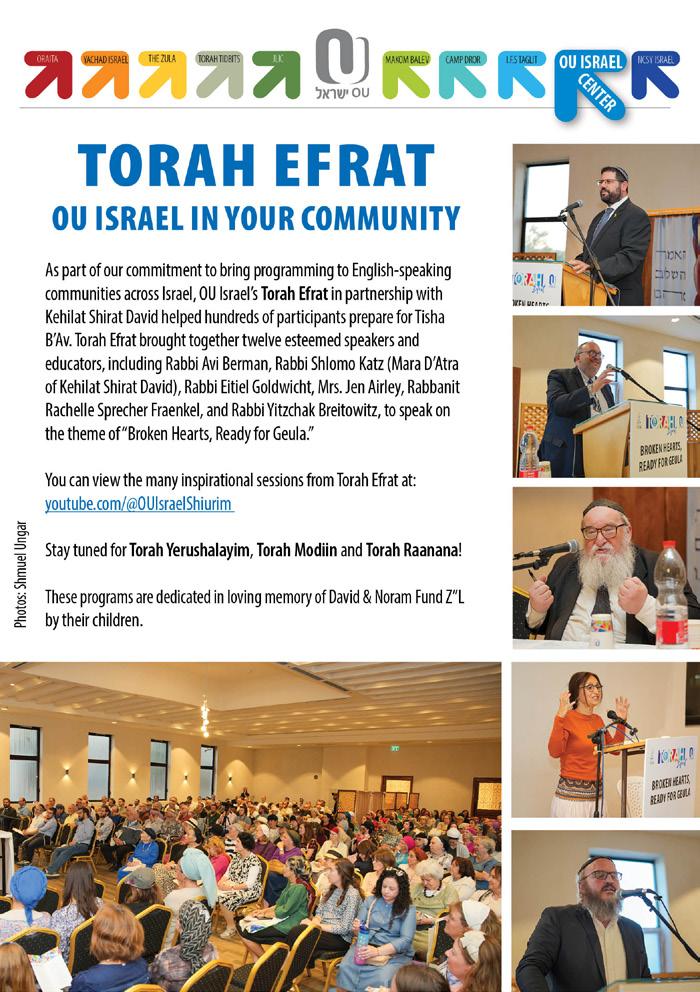
and our next step will be to plant a fruit tree. I never thought of myself as being the agricultural type, but the feeling of settling and planting a portion of Eretz Yisrael, has been truly euphoric. Iy”H, when we plant our tree, and eat the fruits that will grow one day, I think we will be able to truly appreciate that unique Kedusha found in the fruit of Eretz Yisrael!
TO SPONSOR A SHIUR CONTACT
Chana Spivack–050-229-4951 or donate online: https://www.ouisrael.org/donate/ou-israel-center/
RABBI SNOW’S SHIUR is generously sponsored for this academic year by Scott & Linda Haniford
RABBI SHAI FINKELSTEIN'S SHIUR
Sponsored for this academic year by the Sondhelm and Wertenteil families in memory of Mel David z"l
RABBI ADLER’S SHIUR
Sponsored for this academic year by the Frist family in memory of their beloved daughter and sister Elisheva Frist a"h–
To conclude, when you buy your Tu B'shvat fruit this year, don’t search for those dried apricots and banana chips imported from Turkey. Rather, head over to the fresh produce and buy yourself some nice juicy Kedusha-filled Jaffa oranges and thank Hashem for bringing you to this land in order to be able to הבוטמ עבשלו הירפמ לוכאל, imbibing that Kedusha in every bite that you take!!
Torah Tidbits distribution welcomes back Kibbutz Sa’ad and Alumim which were evacuated after the events of October 7th

• 3 rooms apartment
• Quiet, near a park
• 3 full exposers
all you need in a home exposures
• Great location
• Elevator
• Sukkah balcony
• MM"D
• Storage room
• Private Parking
• 2 full bathrooms
• Under floor heating and A/C



Aliya-by-Aliya Sedra Summary
RABBI REUVEN TRADBURKS
Rabbi Reuven Tradburks
RCA ISRAEL REGION
RCA Israel Region
Moshe’s long soliloquy that is the book of Devarim has a deliberate structure. The first 3 parshiot, including Eikev, are prose. The next 3 parshiot are mitzvot; instructions as to how to live in the Land of Israel. And the last 5 are a gaze into the future.
In these first 3 parshiot, Moshe is preparing the people to enter the Land – without him as leader. He is nervous about various possible failures. And he tackles these concerns one by one. His first concern is what is on the people’s minds now: how are we going to conquer the Land without Moshe? He encourages the people that they will succeed, reviewing the story of the spies, as if to say, don’t repeat that.
Then he moves on chronologically: once you are in the Land, I have concerns that you may be drawn to the religion of the land, the idol worship you will see. To meet that challenge, he reviewed Mt. Sinai: You have been spoken to, have had a rendezvous with the Divine. And have a covenant of this bond between you and Him. That is special and unique. The mitzvot are an expression of this bond; be sure to keep those mitzvot.
Our parsha tackles different challenges as you enter the Land. Moshe begins the parsha with a glorious promise. When you are loyal to this covenant, G-d will love you, bless you and make you great. And that, Moshe says, is a conundrum. Because the blessing of
riches and success brings its own challenge: the challenge of hubris. Moshe draws on the foundational experiences in the desert, the manna, the sin of the golden calf to teach how to confront the inevitable hubris that riches and success engender.
This parsha then winds down Moshe’s instructions on how to be successful in the Land without him. And as he is closing this section, he uses deeply emotive language. Of loving G-d, cleaving to Him, being absorbed with Him. The most emotive and personal section of the entire Torah.
On the heels of you keeping the mitzvot, G-d will keep His covenant with you. And love you. You will enjoy success: economic, health, military. Should you fear the nations in the Land, wondering how you will prevail over them, remember what G-d did in Egypt. The signs, the wonders, the outstretched arm. He will do similar to these nations. When you enter the Land, remember the manna in the desert. G-d relieved your hunger through manna, to teach you that bread comes from Him. Now when you enter the Land, it will be different: streams and springs, wheat, barley, grapes, figs, pomegranates, olive oil and dates. You will eat and be satisfied and bless G-d for all this bounty. In the long list of concerns Moshe knows the people are feeling, the impending war to conquer the land comes first. Moshe draws on history to address this concern; remember Egypt. They were more powerful. But G-d
intervened with plagues and wonders. You need not fear.
Bounty in the Land is a concern. The food grows on trees, wild wheat and barley. Who needs Him? Remember the manna and Who provides. That manna was a lesson that He provides. In the Land, it will look to you completely different, what with the food growing from the ground and on trees. But do not let that bounty muscle G-d out; it is still He Who provides. We, this generation of fabulous wealth know all too well how the success of the modern Jew has left little room for the Divine.
2ND ALIYA (8:11-9:3)
Be mindful amidst all your success that you not forget its Source. Even after He has led you all these years, you are apt to say “all this success is my doing”. Remember: He is the One Who gives you this success, as an expression of the covenant he made with you. If you forget Him, He will vanquish you. As you vanquish nations in the Land, so too will it be with you, on the heels of your ignoring Him. Great nations await you; fortified cities, strong people. Know that He will champion your cause and they will be overcome by you.
Material success squeezes G-d out of our lives. And so too national success, both military prowess and economic success can squeeze Him out too. We will assume that the architect of our success is me. We will think that we are simply stronger, smarter and more capable than the other nations.
3RD ALIYA (9:4-29)
Do not assume your displacing the nations is due to your righteousness and their folly. It is rather due to their failing and G-d’s covenant to you.
Remember: you have a long history of your own folly. At Horeb: I ascended the mountain to get the tablets, Divinely inscribed with all He spoke at Sinai, for 40 days. But He ordered me to descend for you had made an idol. With the tablets in hand, I descended, shattering them upon seeing the golden calf. I ascended again to plead for you. And there were other moments of folly. But I pleaded, appealing to the covenant, that you are His people.
When you feel superior to the nations, well, let me remind you. Remember the golden calf, your terrible moment of folly. Don’t delude yourself, thinking yourself infallible, indestructible. Remember our history. Learn from it. You failed with the golden calf. You survived due to G-d’s loyalty to His covenant with you. He champions our cause. He is the source of our success. Don’t let it go to your head. You suffer foibles like all others. Bad mistakes. He does not give up on you. But that says more about His greatness than it does about yours.
4TH ALIYA (10:1-11)
G-d said to me: chisel 2 stone tablets to replace the first and make an Aron for them. A second set as the first was made and put in the Aron. I descended with the Aron. The Leviim shall be G-d’s servants; they bore this Aron. I implored successfully for you not to be destroyed. G-d said: go up and take the Land I promised to your forefathers.
This is the conclusion of the story of the golden calf. Moshe is telling the people to remember this story to temper their feelings of superiority. Don’t feel superior; the golden calf was quite a failure. However, in this conclusion, he emphasizes a different point. Reconciliation. As if to say: you are not a perfect nation. You have failed and you will in the
future too. But despair not. G-d’s commitment to you is more powerful than your failures. In addressing these 3 concerns: fear, riches and national success, Moshe has addressed a more global concern. Can we look at our success and failure as barometers of Divine favor? When it is going well, doesn’t that mean He is pleased with us? No, Moshe says. He is generous, forgiving. His Ways are tricky; you may be displeasing, but He magnanimous.
5TH ALIYA (10:12-11:9)
Now, what really does G-d want of you? Only this: fear Him, walk in His ways, love and serve Him and keep all He commands of you. His is the universe, yet He chose to love your forefathers. So, circumcise your heart and quit stiffening your neck. Fear, serve, cleave to Him. He is your G-d. As you yourself have seen: you descended to Egypt with 70 souls, all the wonders He wrought, the defeat of Egypt’s might at the sea, the desert, the earth swallowing the rebellious ones in the Korah rebellion. You have seen all this; hence, keep the mitzvot to prolong your stay on the Land.
These 20 verses are very difficult to summarize, as they are so stunningly beautiful. This is Moshe with his hair down. It is like he leans a bit closer, elbows on the table, and confides: listen, really, what does G-d want? Now, one would think maybe a one word, one phrase answer. Like: loyalty. Or walk humbly with Him. Or truth. Moshe’s answer is not what to do but how to do.
For Sale: 5 room apt. on Harav Berlin St.renovated, beautiful, quiet location, 3 exposures, 1st floor, master bedroom, 3 bathrooms and more...
Roman Realty (Ruby) 025665546 | 0522810999 | Romanrealty1@012.net.il
Moshe answers: you know what G-d wants? He wants emotion, aspiration, feelings, sensitivity. He wants your deepest being to want Him, love Him, cleave to Him. Drop the inhibitions, the distractions, the fluff of life and give your deepest self to Him. What a phrase: circumcise your heart, quit stiffening your neck. Meaning, give Me your true heart, don’t be stubborn. This aliya ranks up there with the most powerful of the Torah. For Moshe baits us with a simple question: after all, what does G-d want? And in his answer, shares with us his deepest feelings, a most profound answer: He wants you to want Him, love Him, be preoccupied with Him. Hold nothing back.
6TH ALIYA (11:10-21)
The Land of Israel is not like Egypt: Egypt is fertile, with an abundance of water. Israel relies on the rain from the heavens; hence G-d gazes upon the Land the entire year. (2nd paragraph of Shema) And if you will keep the mitzvot and love G-d with all your heart, then there will be rain. If you sway from this and serve other gods, then there will be no rain, nor will the crops grow. Be cognizant of this all the time, speaking of it with your children and in all you do. As this love of G-d will prolong your success in the Land.
This is a new twist on the theme of loving G-d. Not only will your military success depend on your love of G-d. But the rain too. And you’ll need rain; not like Egypt. It’s almost like G-d is saying: I am bringing you to the promised Land because of My love for you. But, it is a Land that will require you to defeat nations to occupy it. And a Land that requires My showering it with rain. And the success of both of these, the military and the
rain, require you to love Me. So, in a nutshell: I love you and I am bringing you to a Land where you will need to love Me.
7TH ALIYA (11:22-25)
If you do the mitzvot, love G-d and cleave to him, then you will prevail over the powerful nations of the Land. G-d will make them fear you and none will be able to stand up to you.
Love, cleaving, the heart. The word love appears 6 times, the word heart 4 times in these last aliyot. Moshe has pivoted. From doing. To feeling. From law. To spirit. Doing is not enough. Love, cleave, your heart. Give all in your love of G-d.
YESHAYAHU 49:14- 51:3
This week’s haftorah is the second of a series of seven “haftorot of Consolation.” The exiled Jewish people are concerned that Hashem has abandoned them. Hashem responds by reassuring them that it is not so. God compares His love and mercy for His people to that of a mother for her children.
The navi then describes the ingathering of the exiles which will occur when the Mashiach arrives and then concludes with
encouraging words, reminding us of what had happened to our ancestors, Abraham and Sarah. Just as they were blessed with a child when it seemed impossible, so too, Hashem will send us the Redemption at the end of days.
46th of the 54 sedras; 3rd of 11 in Devarim. 231.83 lines in a Torah; rank: 14th. 10 Parshiyot; 6 open, 4 closed. 111 pesukim - rank: 26th (4th in Devarim). Same number as Vayikra, but larger. 1747 words - rank: 16th (3rd in Devarim). Same number as Ki Tavo; Ki Tavo has more pesukim; Eikev has more letters. 6865 letters - rank: 14th (3rd in Devarim) Eikev’s pesukim are long - 3rd longest in the Torah in words and letters per pasuk. This accounts for the rise in ranking in those categories.
8 of 613: 6 positives, 2 prohibitions.
BY RABBI CHANOCH YERES RAV, BEIT KNESSET BEIT YISRAEL, YEMIN MOSHE
“Who shows no favor and takes no bribe, but executes justice for the orphan and the widow, and loves the stranger, giving him food and clothing. Therefore, love the stranger, for you were strangers in the land of Egypt (10:17-19)
Rashi points out that this Pasuk is teaching us that G-d will neither take a bribe nor be appeased by money.
The Ketav Sofer (Rabbi Avraham Shmuel Sofer 1815-1871) asks: How can one possibly be concerned that G-d could be satisfied with monetary bribes? What is Rashi implying?
He answers that the meaning of Rashi “nor will he take bribes” is that– G-d does not accept bribes in the form of charity performed by an individual. Even though, the person has good intentions to help the widow, orphan and stranger, G-d will not accept his charity to atone his past sins. One cannot buy Heavenly atonement for our sins by giving charity. Rather, as the Pasuk concludes, you are to cherish and provide for the stranger because you were once yourselves, strangers in a foreign land and not to pacify G-d.
Shabbat Shalom


EMT Saves Baby from Severe Allergic Reaction Following First Taste of Tahini
On a recent Tuesday morning in Jerusalem, parents were feeding their 6-month-old baby and introduced him to tahini for the first time. Within minutes, the baby developed a severe allergic reaction. The infant's parents immediately called emergency services, seeking urgent help.
A medical emergency on a flight from Georgia to Israel was resolved without requiring an emergency landing, thanks to the intervention of a United Hatzalah volunteer EMT who happened to be on the flight.
United Hatzalah volunteer EMT Shalom Klein, alerted to the emergency through his proximity alert system, sprang into action as the first responder on the scene. Arriving promptly, Shalom was confronted with a distressing sight - a baby boy with swollen lips and tongue, struggling to breathe, and covered in a worrisome rash.
Yinon Tsarfati, an EMT and ambulance driver with the volunteer-based EMS organization, responded when a 70-year-old female passenger became ill during the flight. The woman had briefly lost consciousness during the flight on Thursday, prompting flight attendants to request medical assistance over the plane's intercom.
Tsarfati conducted a blood sugar test using a device borrowed from another passenger. The test revealed low blood sugar levels, which had caused the woman's condition to deteriorate. Using medical equipment available on the aircraft, Tsarfati provided initial treatment and monitored the patient's vital signs. He successfully stabilized her condition, eliminating the need for an emergency landing.
Recognizing the symptoms as indicative of an anaphylactic shock, the volunteer knew immediate intervention was crucial. Without hesitation, he administered a life-saving EpiPen injection, delivering a dose of epinephrine to counteract the severe allergic reaction. The powerful medication quickly took effect, and the infant's breathing became less labored. The swelling in the lips and tongue began to subside, providing much-needed relief to the child. As the symptoms continued to recede, the EMT monitored his condition while awaiting the arrival of a mobile intensive care ambulance. Several minutes later, the ambulance team arrived and transported the infant to the nearest hospital for further treatment and observation.
Reflecting on the incident, Shalom emphasized the importance of having an EpiPen readily available. "It's a great thing I had an EpiPen in my medical kit," he stated. "An EpiPen can save a person's life within minutes and is a huge help for both EMTs and patients."

Upon arrival in Israel, Tsarfati reflected on the experience: "This incident reminds us that medical emergencies can happen anywhere, at any time. As EMTs, we're trained to be ready to help in all situations. It's gratifying to know that our skills can make a difference, whether on the ground or at 30,000 feet."
Yosef Ezriel ben Chaya Michal
Chana bat Bruriah
Benzion Simcha Mendel Ben Chana Rachel
Feyge Sara bas Chaya Peshe
Nechama Charna bat Feigel
Leah Naomi bat Tova
Pesach ben Sarah Frieda
Rina Feigle bat Rivka
Elianna Esther bat Channa Ada
Doris Weinberger a"h
Patience
Max Weinberger z”l
Greatly missed by their children, grandchildren and great grandchildren
Rav Aryeh and Dvora Weinberger
Bernie and Leah Weinberger
Menachem and Hannah Katten
a more fascinating name: call it hope."
In observance of the Shloshim of our friend Yehuda Leib Berren z"l
Rav Menachem Weinberg will give a shiur in his memory "Heroic Joy"
Monday evening, 23 November/ 8 Kislev 7:30pm
Zoom Meeting: 853 8980 1519
Password: Yehuda




shmuelnathan4@gmail.com


Covenant & Conversation
THOUGHTS ON THE WEEKLY PARSHA
RABBI LORD JONATHAN SACKS ZT"L
RABBI LORD JONATHAN SACKS ZT"L
FORMER CHIEF RABBI OF THE UNITED HEBREW CONGREGATIONS OF THE COMMONWEALTH
FORMER CHIEF RABBI OF THE UNITED HEBREW CONGREGATIONS OF THE COMMONWEALTH
say to yourself, “My power and the strength of my hands have produced this wealth for me.” ... If you ever forget the Lord your God... I testify against you today that you will surely be destroyed. (Deut. 8:11-19)
May the learning of these Divrei Torah be תמשנ יוליעל
HaRav Ya'akov Zvi ben David Arieh zt"l
What is the real challenge of maintaining a free society? In parshat Eikev, Moses springs his great surprise. Here are his words: Be careful that you do not forget the Lord your God... Otherwise, when you eat and are satisfied, when you build fine houses and settle down, and when your herds and flocks grow large and your silver and gold increase and all you have is multiplied, then your heart will become proud and you will forget the Lord your God, who brought you out of Egypt, out of the land of slavery... You may
What Moses was saying to the new generation was this: You thought that the forty years of wandering in the wilderness were the real challenge, and that once you conquer and settle the land, your problems will be over. The truth is that it is then that the real challenge will begin. It will be precisely when all your physical needs are met – when you have land and sovereignty and rich harvests and safe homes – that your spiritual trial will commence.
The real challenge is not poverty but affluence, not insecurity but security, not slavery but freedom. Moses, for the first time in history, was hinting at a law of history. Many centuries later it was articulated by the great 14th century Islamic thinker, Ibn Khaldun (1332-1406), by the Italian political philosopher Giambattista Vico (1668-1744), and most recently by the Harvard historian Niall Ferguson. Moses was giving an account of the decline and fall of civilisations.
Ibn Khaldun argued similarly, that when a civilisation becomes great, its elites get used to luxury and comfort, and the people as a whole lose what he called their asabiyah, their social solidarity. The people then become prey to a conquering enemy, less civilised than they are but more cohesive and driven. Vico described a similar cycle:
“People first sense what is necessary, then consider what is useful, next attend to comfort, later delight in pleasures, soon grow dissolute in luxury, and finally go mad squandering their estates.”
Bertrand Russell put it powerfully in the introduction to his History of Western Philosophy. Russell thought that the two great peaks of civilisation were reached in ancient Greece and Renaissance Italy. But he was honest enough to see that the very features that made them great contained the seeds of their own demise:
What had happened in the great age of Greece happened again in Renaissance Italy: traditional moral restraints disappeared, because they were seen to be associated with superstition; the liberation from fetters made individuals energetic and creative, producing a rare fluorescence of genius; but the anarchy and treachery which inevitably resulted from the decay of morals made Italians collectively impotent, and they fell, like the Greeks, under the domination of nations less civilised than themselves but not so destitute of social cohesion.
Niall Ferguson, in his book Civilisation: the West and the Rest (2011) argued that the West rose to dominance because of what he calls its six “killer applications”: competition, science, democracy, medicine, consumerism and the Protestant work ethic. Today however it is losing belief in itself and is in danger of being overtaken by others.
All of this was said for the first time by Moses, and it forms a central argument of the book of Devarim. If you assume – he tells the next generation – that you yourselves won the land and the freedom you enjoy, you will grow complacent and self-satisfied. That is


Jerusalem Real Estate is My Business Eta: 054-723-3863
Amazing stand alone homes in OLD KATAMON, TALBIYA, BAKA, GERMAN COLONY
Near BAKA. 234 net sqm on one floor, roof terrace, 126 sqm. 2 underground parking spots, Shabbat elevator & storage.
Private home for sale in the GERMAN COLONY. 500 sqm living space. New construction. Call for more info
In GERMAN COLONY. 300 sqm plus 170 sqm registered garden. Plus parking & roof top terrace.
18.000,000 NIS
In SAN SIMON. Fantastic 150 sqm on one floor, 2 elevators and underground parking, terrace with amazing views and partial sukka. Great condition.
7,500,000 NIS
180 sqm Penthouse on an exclusive street in ARNONA 40 sqm balcony, registered parking. Very high standard finish.
9,800,000 NIS
In BAKA, 236 sqm on two floors, plus 80 sqm of outdoor space, high ceilings, authentic Jerusalem bldg with modern addition. 4/5 bedrooms, office/ or sitting room. Master suite on entrance level. Parking & storage.






Eta Morris Realty, Ltd. etamorrisrealestate@gmail.com Eta: 054-723-3863 etamorrisrealty.co.il
the beginning of the end of any civilization. In an earlier chapter Moses uses the graphic word venoshantem, “you will grow old” (Deut. 4:25), meaning that you will no longer have the moral and mental energy to make the sacrifices necessary for the defence of freedom.
Inequalities will grow. The rich will become self-indulgent. The poor will feel excluded. There will be social divisions, resentments and injustices. Society will no longer cohere. People will not feel bound to one another by a bond of collective responsibility. Individualism will prevail. Trust will decline. Social capital will wane.
This has happened, sooner or later, to all civilisations, however great. To the Israelites – a small people surrounded by large empires – it would be disastrous. As Moses makes clear towards the end of the book, in the long account of the curses that would overcome the people if they lost their spiritual bearings, Israel would find itself defeated and devastated.
Only against this background can we understand the momentous project the book of Devarim is proposing: the creation of a society capable of defeating the normal laws of the growth-and-decline of civilisations. This is an astonishing idea. How is it to be done? By each person bearing
Car owner
and sharing responsibility for the society as a whole. By each knowing the history of his or her people. By each individual studying and understanding the laws that govern all. By teaching their children so that they too become literate and articulate in their identity.
Rule 1: Never forget where you came from.
Next, you sustain freedom by establishing courts, the rule of law and the implementation of justice. By caring for the poor. By ensuring that everyone has the basic requirements of dignity. By including the lonely in the people’s celebrations. By remembering the covenant daily, weekly, annually in ritual, and renewing it at a national assembly every seven years. By making sure there are always Prophets to remind the people of their destiny and expose the corruptions of power.
Rule 2: Never drift from your foundational principles and ideals.
Above all it is achieved by recognising a power greater than ourselves. This is Moses’ most insistent point. Societies start growing old when they lose faith in the transcendent. They then lose faith in an objective moral order and end by losing faith in themselves.


Rule 3: A society is as strong as its faith. Only faith in God can lead us to honour the needs of others as well as ourselves. Only faith in God can motivate us to act for the benefit of a future we will not live to see. Only faith in God can stop us from wrongdoing when we believe that no other human will ever find out. Only faith in God can give us the humility that alone has the power to defeat the arrogance of success and the self-belief that leads, as Paul Kennedy argued in The Rise and Fall of the Great Powers (1987), to military overstretch and national defeat. Towards the end of his book Civilisation,
Niall Ferguson quotes a member of the Chinese Academy of Social Sciences, part of a team tasked with the challenge of discovering why it was that Europe, having lagged behind China until the 17th century, overtook it, rising to prominence and dominance.
At first, he said, we thought it was your guns. You had better weapons than we did. Then we delved deeper and thought it was your political system. Then we searched deeper still, and concluded that it was your economic system.

But for the past 20 years we have realised that it was in fact your religion. It was the (Judeo-Christian) foundation of social and cultural life in Europe that made possible the emergence first of capitalism, then of democratic politics.
Only faith can save a society from decline and fall. That was one of Moses’ greatest insights, and it has never ceased to be true.
These weekly teachings from Rabbi Sacks zt”l are part of his ‘Covenant & Conversation’ series on the weekly Torah teaching. With thanks to the Schimmel Family for their generous sponsorship, dedicated in loving memory of Harry (Chaim) Schimmel. Visit www.RabbiSacks.org for more.



24\7 CONCIERGE ,4 ELEVAOTORS ,BOUTIQUE BUILDING ,SUCCAH 4 PRIVATE PARKING ,GYM , QUALIFIED BUYERS ONLY!



BY RABBI NACHMAN (NEIL) WINKLER FACULTY, OU ISRAEL CENTERL
The tragic words that open this week’s haftarah (“Vatomer Tziyon Azavani Hashem Vashem shechechani”) are more than cries of hopelessness from an exiled Israel who believed that Hashem had abandoned or forgotten her. This unfortunate cry also reflects the belief of many in the “post-churban generation” that their exile and their enemy’s destruction of both Yerushalayim and the Beit HaMikdash indicated that they should no longer worship the One G-d. Having been overwhelmed by the Babylonian power that defeated Hashem’s chosen nation and succeeded in destroying Hashem’s “house,” the people were convinced that they would now worship the Babylonian “god” who, clearly, they believed, proved his strength to be “greater” than that of their G-d (ch”v). However, we should not be surprised that, due to their defeat, the people assumed that they should no longer worship Hashem, Who, in their mind, had “abandoned” them. In fact, Israel’s embracing the pagan belief that victory of one’s nation proved its


“god’s” supremacy over the defeated deity, is condemned throughout the writings of the prophets. Yirmiyahu, for example, authors Sefer M’lachim, recording the nation’s growing corruption and sinfulness, in order to teach the population that, even in the Diaspora, they were expected to follow Hashem’s laws. Yirmiyahu impressed upon them that their defeat was NOT that of Hashem nor was it a reflection of His “powerlessness” (ch’v). The defeat was one of theirs alone and was brought upon them by G-d Himself, a punishment to their own refusal to heed the warnings Hashem sent to them over the course of many years.
We see this misguided assumption being addressed to the exiled masses quite clearly in the writings of the navi Yechezkel as well, when he warns the exiles (Yechezkel 20; 32): “And that which you believe will not come to be, when you say: ‘We will be like other nations and worship (gods of) wood and stone’ “
However, Yishayahu’s reaction to the nation’s beliefs that we read in our haftarah, is different from the responses of both Yirmiyahu and Yechezkel. Rather than criticize and condemn the people, Yishayahu turns to Israel in a soothing tone and with comforting



Mazal Tov to Chana & Roy Karp and family on the engagement of their grandson
words. He explains that, as a mother could never forget her infant child or fail to show compassion, so G-d could never forget His nation or fail to be merciful to them. The navi reasserts that Israel is eternally bound to G-d through the covenant made to their ancestors and, sin though they might, they will always remain chosen by G-d. In simple terms, this suffering generation is taught by Yishayahu that Hashem’s punishment does not mean Hashem’s rejection.
That is why the subsequent p’sukim of the haftarah describe the bright future that awaits Israel. Yishayahu supports his comforting words with a prophecy of a massive return to Israel, of a repopulating of the currently barren cities and of a rebuilding of destroyed edifices. He even adds that the other nations will lend their support to Israel’s return and closes his message by guaranteeing that joy and gladness will return to the once-grieving land so that it will be filled with jubilant music and prayers of thanksgiving to Hashem.
It is a vision that we hope to see soon with our own eyes.
Rabbi Winkler’s popular Jewish History lectures can be viewed by visiting the OU Israel Video archive: https://www.ouisrael.org/video-l ibrary


NEW LISTING! Luxury residence Mishkenot Hanassi with facilities - Spacious 3 rooms, 120m, 2 succah terraces with beautiful views to the Knesset, doorman 24/7, large indoor pool, parking, storage.
MAYA - 054-6650184
NEW LISTING! Unique penthouse on a small lane of German Colony - 200m magnificent penthouse, private elevator, high ceilings, large terrace sukkah, surrounded by greenery, parking, very quiet.
NEW LISTING! San Simon - 105m apartment in a new building, 4 rooms, balcony, private parking & storage room, only 5,800,000 NIS. MAYA - 054-6650184
Unique luxurious 550m duplex Penthouse - Facing the magnificent Old City views, Talbieh, Authentic building, 100m terrace, shabbat elevator, parking FOR SERIOUS BUYERS ONLY. DEBORAH - 054-4804767
New in Baka - 180m new penthouse on one level, 5 rooms, large succah terrace, additional 40m storage, very high ceilings, shabbat elevator, parking, ready in 20 months. DEBORAH- 054-4804767
Small quiet lane of German Colony - New private house of 500m built, prime location, plot of 560m, 3 levels, possibility for a pool, high ceilings, full of character and light, views. DEBORAH - 054-4804767
New luxurious project close to Baka2,3,4 and 5 rooms, luxurious penthouse with terraces, gardens, magnificent design, private parking and storage.
JULIA - 054-7007436
On a landmark building on Ben Maimon St, Rechavia - 150m garden apartment with 35m private garden, high ceilings, lots of potential. JULIA - 054-7007436
In a luxurious building in Talbieh with hotel facilities 200m on one level, large terrace facing the forest, pool, gym, spa, luxurious lobby, 2 parking spots, storage, ready to move in!





For Sale: Great new building under construction in Talpiot - 2-5 rooms, starting at 2.09m shekel
For Sale in Netanya: New building, 5 rooms, 142m + 25m mirpeset, awesome sea view, 5th floor with Shabbat elevator, gym, 4.28m shekel
For rent in Katamon: 30m studio on Bustani street, ground floor, small garden, for independent people over 55, 3500 shekel/ month incl va'ad, hot water and heat







TALBIEH - Private Land:
*TAMA 38: 4 Rms, 120 sqm (incl. MB en suite), balcony, Shabbat elevator, Old City view! Occupancy: February 2026.
*Boutique building 550 sqm, 3 apartments.
SHAAREI CHESSED / RECHAVIA
*Duplex! 5 bdrms, 25 sqm kitchen, succah, shabbat elevator, 2 parking, storage.
*New 228 sqm duplex penthouse, 30 sqm succah, shabbat elevator, parking, view
NACHLAOT / CITY CENTER
*2 Rms, priv. entr. storage room, NIS 2,190,000
*2 One bedroom apartments, renovated, purchase together or separate, shabbos elevator, view!
OLD KATAMON
160 sqm 4 bdrms, garden, storage, parking
HAR NOF
Centrally Located– 10 room duplex with 400 sqm garden (room for a pool), excellent condition


Rabbi Shalom
ROSNER
RAV KEHILLA, NOFEI HASHEMESH MAGGID SHIUR, DAF YOMI, OU.ORG
Rav Kehilla, Nofei HaShemesh
Maggid Shiur, Daf Yomi, OU.org
In this week’s parsha we are introduced to what many believe to be the only biblical blessing אתיירואדמ הכרב – the bracha of Birchat Hamazon.
Rav Shlomo Zalman Auerbach once said that it is harder to bench properly than to daven properly. During davening one is in shul and the atmosphere is conducive to concentrating. When sitting around a table, with people talking or cleaning it is more difficult to focus with the proper kavana.
Rav Schwab discussed the difficulty of how to best fulfill the mitzvah of Seudat Shlishi when Erev Pesach is on Shabbat. One is restricted from eating bread from early in the morning. Many suggest that one should wash and have a little to eat early in the morning, walk around the block and then wash and eat and bench again. Rav Schwab claimed that he could not do such a thing – bench twice in such close proximity. This highlights how much effort he put into benching that it was difficult to repeat again within such a short period of time.
It is told that on one of Rav Shach’s later birthdays, his talmidim inquired as to what the Rav would take upon himself in the
coming year. Would it be another siyum hashas? Some act of kindness? The Rav replied, I will seek to recite Birchat HaMazon from a bencher. It is obvious that Rav Shach knew the benching by heart, but he knew that without the use of a bencher, it is possible to recite the brachot improperly.
These “tidbits” illustrate the importance of benching. Since according to many it is the only bracha m’dioraita, we should do our best to try to recite Birchat HaMazon with the proper kavana.
Rav Solovetchik in Masoret Harav distinguishes between benching and davening. The Gemara (Berachot 34b) states that although we bow during modim in the Amida, it is inappropriate to do so when we recite “nodeh” in benching. This distinction is due to the fundamental different modes of approaching Hashem that we experience in tefillah versus Birchat HaMazon.
As the Rav so beautifully declares: “Prayer is the act of insubstantial man lacking the wherewithal to subsist appearing before the all-powerful Being upon whom his existence depends. When one prays, one is afflicted with troubles and is unable to overcome them without the help of God.” This is distinguished from Birchat HaMazon which is recited on a full stomach to express our gratitude to Hashem for the material blessings He has bestowed upon us.
There is a machloket between the Rambam and Ramban as to whether or not there is an obligation to daven. The Rambam believes that there is an obligation to pray each day
Before receiving the Torah at Mount Sinai, there were some Israelites that, of their own accord, already kept the entire Torah. Since this is the case, why is this day so important?
ing college students and young professionals.
On the day of Matan Torah 2 things changed. Firstly the Jews gained a connection to Hashem. Hashem put his essence into the Torah so when he gave it to us both those that had and had not kept the Torah before were now keeping it because of this connection to Hashem’s essence.
Secondly, the Torah given at Mount Sinai is able to have an effect on the physical world whereas before Torah and mitzvot were considered strictly spiritual matters.
(Mitzva 5). The Ramban posits that the obligation to pray arises only when one is in an תע הרצ – a moment of danger or difficulty. The Rav elsewhere explains that there is really no argument between the Rambam and the Ramban. Everyday is defined as an הרצ תע. There is uncertainty on a daily basis. Therefore, both would agree that one should pray daily. There are various manners and emotions with which we approach Hashem. One engages in Tefillah when one is uncomfortable. One recites Birchat HaMazon when one is satiated. Even within tefilla there are blessings of האדוהו השקב ,חבש – praise, request and gratitude. We ought to focus on what we are reciting and recognize the way in which we address our Creator. May we be blessed with material and spiritual blessings and be able to properly express our gratitude for all of God’s gifts!

The Talmud (Shabbat 88b) states that when the Jews heard G-D’s divine voice, they all died from its intensity and after wards G-d brought them back to life. I think this emphasizes why Hashem cannot be openly present in this world. For if he was, the Jews’ free will would no longer be preserved and we would follow Hashem in everything. If his awe and will were so apparent, we would be compelled to follow him without having a real choice.
JLIC at Tel Aviv University does amazing work in bringing Jews together and teaching us all about the torah we received at Mount Sinai. JLIC, I believe, helps us
Monday
7:00-9:00pm Call to

JLIC Israel’s goals include: building a warm and welcoming Jewish community for students and young professionals; providing engaging and dynamic Jewish education; providing a supportive home environment for Olim; providing resources for personal and religious growth, including personal mentoring, Aliyah support, religious guidance and leadership development. Current JLIC programs in Israel include: Reichman University - Herzliya; Bar Ilan University - Givat Shmuel; Tel Aviv University; Tel Aviv for Young Professionals; and Jerusalem. Contact: Rabbi Jonathan Shulman, Director of OU-JLIC shulmanj@ou.org For

Tzitzit tying at the OU Israel Center with Ruti - no experience needed Mondays at 1:30pm and Wednesdays at 12:00pm
At times, it is important to pause and reexamine things we say all the time but haven’t necessarily thought about carefully. Let us take a look with fresh eyes and insight at the Birkat Hamazon, the Grace after Meals that we say so often. Rav Schorr writes that concentrating on the words and meaning of Birkat Hamazon can infuse one with true yirat shamayim. The Midrash teaches us that Avraham Avinu hosted many guests, and by encouraging them to recognize Hashem as the source of their bounty and express their thanks, he brought them to belief in Hashem. Likewise, if we focus our attention to appreciate the myriad gifts Hashem bestows upon us, we could achieve greater levels of connection with our Creator.
Chazal teach us that the first brachah of Birkat Hamazon was composed by Moshe Rabbeinu when the mann came down from heaven, the second brachah was composed by Yehoshua when Am Yisrael ate from the first harvest after entering the Land of Israel, Dovid Hamelech and Shlomo Hamelech



composed the third brachah of “Rachem” and “Uvenei Yerushalyim,” the fourth brachah was composed by the scholars of Yavne in recognition of the miracle of those who perished in the Beitar massacre, and whose bodies did not decompose until they were brought to a proper burial after many years.
Interestingly, we do not end Birkat Hamazon at this point. We find a whole list of requests, “Harachaman,” may the Merciful one grant us security, blessing and redemption. The tradition of Edot Hamizrach includes eighteen requests corresponding to the Shemoneh Esrei. The Chafetz Chayim explains the significance of this section as taking advantage, so to speak, of the auspicious, favorable moments of being involved in a mitzvah. Just as women light Shabbat candles and then take time to pray for the welfare of their families and the Jewish people, Birkat Hamazon generates propitious moments for Divine favor. Accordingly, then we ask Hashem to sustain us with dignity, end the exile, and bring the redemption, our greatest concerns.
“Bamarom yelamdu,” the paragraph at the end is sung in a familiar tune, but the powerful words are often overlooked. Rav Gamliel Rabinovich, in his work on Birkat Hamazon, details the tremendous potency in this section, in which we ask for no less than five brachot. First, we ask for “mishmeret shalom,” for our homes to be protected from any destructive forces, which includes a brachah for shalom bayit. Second, “ve’nisa bracha me’et
Hashem,” a request to be blessed directly from Hashem. Third, we ask for “tzedakah me’Elokai yishainu,” kindness from Hashem even when we are not worthy. Fourth, “ve’nimtza chen,” we ask to be worthy of finding favor in the eyes of Hashem and the eyes of people. Finally, “ve’seichel tov,” we want to be considered among those with seichel, sense and intelligence. Our intention is that all of this should help us to maximize our mission in increasing kevod Shamayim in our world.
We are living in times of shaky security; we all seek blessing and protection for our families, communities and our nation. Here we have a practical opportunity to connect with our Greatest Protector, by tapping into the enormous power in every word. Let us make the recitation of Birkat Hamazon a time of gratitude, appreciation, and desire for continued flow of blessings from Above.

























• Highest class boutique buildings with only 1 or 2 apartments per floor
• Five star hotel facilities including pool, spa, gym, concierge, synagogue, numerous dining options, maid service, 24/7 security and more
• Ideal location where Talbieh, Old Katamon and German Colony meet.
• Walking distance to Great Synagogue, Old City, Emek Refaim and First Station.
• Private land- Tabu
• Including 2 secure covered parking spots + private storage room.
• Prices starting at 15.7 m Shekels for exquisitely finished 182.5sqm apartment with 27sqm South-facing terrace with sunrise to sunset views over the pine trees of the landmarked ‘Moon Grove’










Executive Director, Camp HASC Author of Baderech: Along the Path of Teshuva (Mosaica 2021)
Mischel EXECUTIVE DIRECTOR, CAMP HASC AUTHOR OF BADERECH: ALONG THE PATH OF TESHUVA (MOSAICA 2021)
As the last surviving son and successor of the Brisker Rov, Rav Meshulam Dovid HaLevi Soloveitchik, zt’l, was a staunch guardian of derech ha-limud, and the family traditions and spiritual practices received from his revered father, the Gaon Rav Yitzchok Zev, “the Gry’z”. As a rosh yeshivah in Yerushalayim, “Rav Dovid” was a faithful gatekeeper of the Brisker dynasty, and of meticulous observance, analytical study and strict and uncompromising adherence to halachah and minhag.
Yeshivas Brisk in Yerushalayim is renowned for its powerful learning and its serious commitment to precision and punctiliousness. One morning, as a talmid arrived late for morning seder, he saw that Rav Dovid was standing in front of the building. Certainly he would notice the bachur’s lateness. Well aware of how makpid the Rosh Yeshivah was about shemiras ha-sedarim and valuing every moment of learning, he lowered his eyes and kept walking quickly, as if he was on his way to some other destination, hoping Rav Dovid wouldn’t see him. But Rav Dovid had seen him….
The Rosh Yeshivah was extremely distressed over what had transpired and struggled to hide his displeasure. He was so visibly upset that his older, closest talmidim finally asked him was wrong. When Rav Dovid described the incident the talmidim seemed unmoved — nu, sometimes a bachur comes later to seder;
it didn’t seem like such a big deal. Rav Dovid explained. While he was bothered by the young man’s lateness, that was understandable. “What hurts me is that he was concerned that I would see him, and he made a shpiel out of it. That means he is worried about what I’ll think, or say, or do. Why wasn’t he concerned about the Ribbono shel Olam thinks? Who am I? Yes, a moment of discomfort before one’s rosh yeshiva is normal. But what about the shame before the Borei Olam? Where have we gone wrong here?”
Our sedra recounts the wonderful brachos that flow from a life of living with ratzon Hashem as well as the pitfalls of forgetting that we are constantly in God’s presence. Pesukim selected from our parshah are customarily recited by many as the Parshas haYirah each day after davening:
And now Yisrael, what does Hashem, your God, ask of you? Only to fear Hashem your God, to walk in all His ways and to love Him, and to worship Hashem your God, with all your heart and with all your soul. To keep the commandments of Hashem and His statutes, which I command you this day, for your good. (10:12-13)
To many of us, living with deep yiras Hashem sounds exceedingly difficult, a level reserved for the likes of Moshe Rabbeinu,
highly attained ovdei Hashem and great roshei yeshivah. Surely, this is where Rav Dovid was standing when lamenting the talmid’s seeming lack of yiras Shamayim. He expected the talmid to be on an exalted spiritual level as if it was completely natural to fear Hashem more than people.
Regarding the language in our pasuk, the Gemara seems to agree: םימש תארי וטא איה אתרטוז אתלימ, “Is yiras Shamayim, fear of Heaven a minor matter that it can be presented as if Hashem is not asking anything significant of us — םא יכ, ‘only’ to fear God?” Rather, “Fear of Heaven is the beginning of wisdom” — yiras Shamayim is valued and treasured over all else! The Gemara then responds:
.איה
Indeed, for Moshe, yiras Shamayim is a ‘minor matter’. As Rebbe Chanina stated, “This is comparable to one who is asked for a large vessel and he has one; it seems to him like a small vessel because he owns one. One who is asked for just a small vessel and he does not have one, it seems to him like a large vessel. Therefore, Moshe could say, ‘What does the Hashem your God ask of you other than to fear’ — because Moshe Rabbeinu had acquired true yirah, in his eyes it was not a big deal.”
For those of us not on the level of Moshe Rabbeinu or the Brisker Rosh Yeshiva, yiras Shamayim is a very big vessel and a very big deal. However, in another Gemara, Rebbe Yochanan (Brachos, 28b), brings a resolution and hamtakah, guiding his students within the reality of the human condition: we are
baderech, in process….
The students of Rebbe Yochanan ben Zakai gathered around his deathbed and said to him: ונַכרב ,ונַיבר, “Our teacher, bless us.” Rebbe Yochanan said to them, אהתש
םדו רשב ארומכ
ארומ, “May it be His will that the fear of Heaven shall be upon you like the fear of flesh and blood.”
His students were puzzled and said: דע ןאכ? That’s it? To that point and not beyond? Shouldn’t one fear God more (than one fears flesh and blood)?” The elderly leader of the generation responded, רבוע
, “If only a person would achieve that level of awe! Know that when a person commits an aveirah, he says to himself: ‘I hope that no person will see me!’ If one would be as concerned about avoiding shame before God as he is before people, he would never in fact sin.”
The Mishnah (Avos, 4:12), too, accepts our fear of flesh and blood, while employing it in our growth toward greater yiras Shamayim:
, “(And let) the yirah you have for your teacher (become) like your fear of Heaven.”
Indeed, earthly fears were created in order to lead us toward awe of Hashem and teshuvah: “Thunder was created to straighten out the crookedness of the heart” (Brachos, 59a). May we therefore accept ourselves if and when fear of flesh and blood or other earthly fears arise — and may we leverage them to achieve higher states of awe and wonder….
The sum of the matter, when all is said and done: have yirah for Elokim and observe His commandments, for this is the whole of human existence. (Koheles, 12:13)
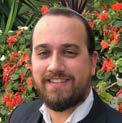
PAGE BY RABBI EZRA FRIEDMAN Director, The Gustave & Carol Jacobs Center for Kashrut Education Director, The Gustave & Carol Jacobs Center for Kashrut Education
The prohibition
Our Sages decreed the prohibition of bishul akum (kosher food cooked by a non-Jew) as a way of distancing Jews from non-Jews. The Talmud and early authorities rule that where there is clearly no intent to cook, there is no prohibition of bishul akum. This article will focus on practical applications of this principle.
According to Biblical law, food that is completely kosher and cooked by a nonJew is permitted. However, our Sages decreed that such food, even when cooked in kosher utensils, is prohibited for consumption. This prohibition is known as bishul akum. In the coming weeks we will discuss the parameters of this rabbinic prohibition, including the reasons behind the decree, when it applies, and the practical halacha for modern industrial kashrut.
maintain that the decree is based on this issue of closeness to non-Jews that could lead to intermarriage; this is the opinion of most early authorities. However, Rashi and others attribute a different reasoning to the prohibition of bishul akum, which is that non-Jews might mix non-kosher ingredients into the kosher food. In future articles we will discuss whether the parameters of bishul akum are based on both of these reasons or just one. However, it is clear from numerous sources that the danger of intermarriage is the main reason behind the prohibition (See Torat Habayit 3:7).
The decree is binding regardless of the reason
Food is a very connecting element in every society. That is the basis behind the decree of bishul akum. Our Sages were very concerned about close relationships with non-Jews since intermarriage is a very severe transgression. The prohibition effectively limits Jews and gentiles dining with each other, although there is no specific prohibition against dining with a non-Jew per se. (See Rashi on Avodah Zara 31:b.)
Forbidding the non-Jew’s cooking would be enough to create an emotional distance such that families wouldn’t marry into each other.
Rabbeinu Tam (Tosfot Avodah Zara 38:a) and Rambam (Ma’achalot Asurot 17:9)
Later authorities cite different cases where the issue of intent is in question. According to all opinions, if the non-Jew had intent to cook a certain type of food but a different food was cooked as well, all the food is equally prohibited (Rashba, Torat Habayit 3:7). For example, if a non-Jew lit an oven with steaks already inside and meant to cook a new piece of chicken that he now placed in the oven, although his intention was only for the chicken, the steaks become prohibited as well. If a non-Jew lit a fire in order to cook and then immediately changed his mind, the food which became cooked with that fire is still prohibited as bishul akum. This is because in halachic terms we go by one’s initial intent when the fire was lit (Aruch Hashulchan, YD 113:29).
There are numerous forms of heating used in modern industrial settings. It is clear that if a non-Jewish worker turns on a large oven for confectionery purposes or starts a boiler to cook fish, the food will be prohibited because of bishul akum. However, there are various types of heating that are not for the purpose of cooking the product, such as pasteurizing to remove/prevent bacteria and blanching vegetables before freezing to preserve flavor. In these cases, there is certainly no intent to cook the product and it seems this can be done by non-Jewish factory staff. Rav Shamai Gross and Rav Shmuel Wosner both tackle the question of pasteurization and other types of heating done in factories (Responsa Shevet Hakehati 5:135; Kovetz Beit Hillel 69). They both rule leniently since these processes are done solely for health or other purposes. They bring proof from an early authority, Maharam of Rothenberg, who rules (Responsum 58) that smoking fish with heat is not considered bishul akum, since it is used to prevent the fish from spoiling. Thus, although pasteurization and blanching involve heat, they are not considered cooking and therefore are not bishul akum if done by non-Jews. In Sefer Chidushim U’biurim (on Avoda Zara 38a), Rav Chaim Greineman tries to refute the lenient opinion. He brings proof from Ran (responsum 5) that cooking honey in order to remove wax prohibits the honey if done by a non-Jew. However, this argument can be easily refuted. Cooking honey in a pot with
Since the transgression of intermarriage was the primary concern behind our Sages’ decree, their goal was to powerfully discourage the possibility of developing emotional connections to non-Jews that could lead to intermarriage either in that generation or the next. Accordingly, early authorities discuss whether the prohibition of bishul akum still applies even in situations where intermarriage is not technically possible. For example, Rashba, in his responsa (1:248), examines the case of food cooked by a priest. Being that Catholic priests do not marry nor do they have children with whom to intermarry, is it permitted to eat food cooked by a priest even though the reason for bishul akum seemingly does not apply to
boiling water is a normal cooking process, in addition to the fact that the person cooking certainly means to do so. Although his intention is only for the purpose of removing the wax, his action is cooking and it’s fully intentional. Pasteurization, on the other hand, is not considered cooking at all by the person doing it, such that the intent to cook doesn’t even come into consideration. It should be noted that this lenient opinion was also the position of Rav Yosef Shalom Elyashiv, who permitted tehina produced by non-Jews since the special roasting process is to remove moisture from within the sesame seeds (Kovetz Beit Hillel 26).
In conclusion, it is halachically permissible to have non-Jews pasteurize, blanch, or heat up products where the intent is clearly for reasons not related to cooking. These products are not prohibited because of bishul akum.
The OU Israel Gustave & Carol Jacobs Center for Kashrut Education was created to raise awareness and educate the public in all areas of kashrut. Rabbi Ezra Friedman, Deputy Rabbinic Administrator for OU Kosher Israel is the Center's director. him? Rashba answers that we have a rule regarding rabbinic decrees: even when the reason does not apply, the prohibition still stands. This is a necessary element in every rabbinic prohibition. Otherwise, Rashba explains, people could rationalize and find reasons why any decree should not apply in their particular situation. Accordingly, Rashba concludes that even food cooked by a Catholic priest has the prohibition of bishul akum. A similar ruling is made by Ramban (Avodah Zara 35:a) regarding non-Jewish royalty who, because of their stature, are prohibited from marrying Jews. He maintains that the fact that the non-Jews are royalty is irrelevant, and that the decree of bishul akum stands regardless of the reason behind it. Taz (YD 112:1) , Shach (YD 112:4) and Pri Megadim (YD 112:1) cite these rulings as axioms of the laws of

Later authorities discuss similar cases where the logic behind bishul akum may not apply. Responsa Shevet Kehati (6:273) rules that even food cooked by a non-Jewish child is considered bishul akum, despite the fact that the chances of marriage seem remote. The same is true for food cooked in a faraway country where Jews cannot travel -- bishul akum still applies.

Our Sages prohibited food cooked by

gentiles, even if the ingredients and utensils are kosher.
The reason cited by most authorities is the risk of intermarriage.
Even in cases with virtually no risk of intermarriage, the food is still prohibited, including non-Jewish royalty, priests, young children, and non-Jews from distant lands.
Kashrut Questions





BY RABBI SAM SHOR
Program Director, OU Israel Center
BY RABBI SAM SHOR PROGRAM DIRECTOR, OU ISRAEL CENTER
In our sedra this week we read the familiar verse- (Devarim 8:10):
When you have eaten and been satiated, you shall bless the Lord your G-d upon the good Land that he has given unto you.
This verse serves as the basis for the recitation of birkat hamazon, as well as the recitation of brachot in general before or after eating, as a sign of our appreciation and acknowledgment that HaKadosh Baruch Hu has provided that sustenance to us.
Our Chazal in the Gemara in Brachot (35b) explain this idea further:
is not solely a vehicle for expressing our appreciation to G-d, but also the vehicle, the pipeline to bring further blessing, sustenance and goodness into the world. If we were to derive pleasure or benefit in this world without reciting a blessing, we would not only be coming up short in our show of gratitude to Hashem for that sustenance, but we would also be missing out on the opportunity to help others by the power inherent in that bracha to metaphysically channel and provide additional sustenance to descend into this world.
Rabbi Chanina bar Pappa said: Anyone who benefits in this world without reciting a blessing is considered as if he has stolen from G-d and from Knesset Yisrael...”
The concept of acknowledging that Hashem has provided us with sustenance and the importance of declaring our appreciation for that sustenance makes sense, but how are we to understand this statement that if we fail to recite a bracha upon deriving benefit, that somehow we have also stolen from the Jewish People as well?
Rabbeinu B’Chaya, points to this gemara in his commentary on our verse. He explains that we need to understand that a bracha
Similarly, the Be’er Moshe, the Admor of Ozerov zy’a, explains that each time we recite a bracha, the spiritual cognition of the gifts that HaKadosh Baruch Hu bestows upon us, is not only a manifestation of Hakarat HaTov for all we have received, but simultaneously becomes the catalyst to experience further bracha. When we acknowledge and are cognizant that Hashem Yitbarach is indeed the source of all blessing,then it opens us up spiritually and metaphysically to seeing and experiencing more and more bracha each and every day.
Yehi Ratzon, may each of us merit to recall the incredible dual capacity for goodness contained within every bracha we recite.
that bringing home a Report Card with all “A’s” on academic subjects will bring them a reward but getting all “A’s” on the Midot side will bring even a greater reward.
Do you have a life insurance policy you:
• No longer want?
• No longer need?
• Can no longer afford the premium?
This Dvar Torah is dedicated in loving memory of Yita bat Shlomo, Rav Aharon Ziegler’s mother whose yahrzeit is on Shavuot.
• Could you use extra money instead of keeping your policy?
I can guarantee that if you qualify with the underwriting process I can get you more money than if you cash it in with the company.
Torah Tidbits extends a mazal tov to Rav Ziegler on his upcoming book of Torah Derashot, “The Sapphire Bricks of Torah”
Please contact Moshe Russell at: Buymypolicy32@gmail.com





• Curtains & draperies
• Designer curtains
• Venetian & Woven wood blinds
• Blackout, Vertical, Roller, Roman & Pleated shades

www.ashleywilde.co.il



ENGLISH SPEAKING LAW FIRM
Orit Madar, Adv Family Law and Mediation Divorce, Child support, Custody Inheritance & Wills
Yariv Madar, Adv.
Bodily Injuries, Medical Malpractice Civil Litigation
10 Hillel St , Jerusalem | 36 Dam hamkabim st , Modiin 02-6255592, 050-3202909
Madar@netvision net il















BY RABBI MOSHE TARAGIN YISRAEL
BY RABBI MOSHE TARAGIN RAM, YESHIVAT HAR ETZION
Before he dies, Moshe warns us not to credit our military successes in Israel to our own moral superiority.:
Our entry into the Land of Israel, along with our subsequent military victories and settlement, should not be credited to our own merit but to broader historical and theological factors. We are just second-hand beneficiaries of a larger calculus.
Our successful entry to Israel would not be the first time that our redemption was undeserved. In sefer Shemot the Torah portrays us as a demoralized and disempowered group of slaves, so overwhelmed that we could not even grasp the news of our redemption, let alone envision entering a distant land flowing with milk and honey.
Our military victories will remain undeserved, and our success in settling Israel will not stem from our “purity of heart.” Instead, Hashem defeated our enemies to fulfill the ancient promise made to our forefathers and to purify the Land of Hashem from pagan influences.
In the very next pasuk Moshe reiterates his stern warning, suggesting that our national obstinacy renders us undeserving:
Little could be expected from a nation that had endured over two centuries of brutal slavery. Sefer Shemot bypasses the question of whether we deserved liberation from Egypt.
Twice, Moshe cautions us not to let our impending success in Israel inflate our egos. We do not merit the success that will be granted to us. Ascribing our military success to our national deservedness is a theological error. Furthermore, this erroneous belief in our national merit could swell our pride and lead to religious laziness and complacency.
Though the Torah sidesteps this issue, Chazal repeatedly imply that we were undeserving. The Midrash describes our national descent to the 49th and final gate of spiritual impurity or the האמוט ירעש ט”מ. Given our precarious religious condition, Hashem hastened the redemptive timeline to prevent us from falling irreparably into a moral abyss. This is not a flattering depiction of a nation worthy of liberation.
Similarly, the Midrash documents a heated argument at Keriyat Yam Suf: heavenly angels wondered why Egyptians were drowning while Jews were granted safe and dry passage across the ocean bed. After all, they argued,
both parties had similarly surrendered to the worship of idols. Though the Torah sidesteps the question of our deserving redemption, Chazal assume that we were not deserving of liberation from Egypt.
YECHEZKEL
Though Sefer Shemot sidesteps the issue of Jewish merit for redemption, Yehezkel is explicit: we did not deserve to be redeemed from Egypt. In Perek 20, Yehezkel describes Hashem inviting us to actively participate in our redemption by discarding our idols and shedding the pagan culture that had infiltrated our imagination. Our response was lackluster. By ignoring His offer, we rebelled against Hashem:
In response to our recalcitrance, Hashem planned to “pour His wrath upon us” and annihilate our people. Despite His anger, He redeemed us not because we deserved it, but because the alternative was unacceptable. Hundreds of years had already been invested in nurturing a nation to embody Hashem’s presence in a world shrouded in savagery and paganism. To eliminate the people of God at that juncture would have led to a regression of Hashem’s presence in a heathen world. Such a regression would have been a profound chillul Hashem.
Yehezkel constantly underscores that our redemption came not because of our merit, but because the alternative—a desecration of Hashem’s name—was intolerable. What is left veiled in Sefer Shemot is starkly illuminated in Yehezkel.
Undeserved redemption, to prevent a chilul Hashem, formed the basis of Moshe

Rabbeinu’s prayers for our nation after the egel debacle. He warned that annihilating the Jewish people would be misinterpreted by the Egyptians and the ancient world, who would mistakenly believe that Hashem was incapable of overcoming the warlords of Canaan. Once again, the concern over chilul Hashem outweighed our national undeservedness, and we were spared.
The second redemption of our people, or Shivat Tziyon, when we returned from Babylonian and Persian exile, was also undeserved. Yirmiyahu had explicitly prophesied a 70-year exile, and by implication, once that period ended, we would return to Zion regardless of our religious state. Nothing about our experience in Babylonia and Persia suggests that we merited redemption. On the contrary,
Ezra’s failed attempt to remove our foreign wives highlights the diminished religious state of the people. Once again, we did not deserve redemption, but we were redeemed, affirming Moshe’s admonition once more.
DO WE DESERVE REDEMPTION?
Which raises a provocative and unsettling question: will we deserve final redemption, or will it be delivered regardless of our merit? The gemara in Sanhedrin (98) cites the position of RebbeEliezer who asserts that redemption is absolute, unconditional and independent of mass teshuvah. Rebbe Yehoshua argues that final redemption will be predicated upon mass national teshuvah. In the absence of religious awakening, redemption will not occur. We are only redeemed if we deserve it. Though the Rambam endorses Rebbe Yehoshua’s conditioning of redemption upon national spiritual restoration, our masorah, by and large, adopted Rebbe Eliezer’s position that final geulah is assured even if we don’t experience mass religious awakening.
By disconnecting geulah from mass teshuvah, did Rabbi Eliezer regard redemption as an undeserved gift, akin to past redemptions? Or did he believe that, despite a lack of national repentance, we still merit final redemption? Perhaps he believed that we are entitled to redemption even without widespread teshuvah? This profound question touches the very essence of Jewish identity and peoplehood.
Some claim that without mass teshuva and a national return to religion and ritual, no generation deserves to be redeemed. In our generation, while Torah study and mitzvah performance have dramatically improved across the Orthodox world, most of our people- both in Israel and abroad- do not
observe a Torah lifestyle. Under this view, in our current state, we do not deserve redemption and can only merit it, as in the past, as “fortunate beneficiaries” of a larger historical calculus. In this view teshuvah-less redemption is completely undeserved.
But there is a different way to view the final chapters of history and the calculus of final redemption. Perhaps, at this stage of history, the Jewish people deserve to be redeemed even without a broad-scale religious revival. A lot has changed since we left Yerushalayim in shame in 70 CE. We have endured a fearsome exile, yet we have persevered, upholding the presence of Hashem in a violent world. We have much to be proud of and deserve redemption. Geulah is an aggregate process. Perhaps our specific generation does not merit redemption on its own, but the accumulated merits of Jewish history call for it.
This perspective is implicit in Shir Hashirim. At the outset of the story, the woman—symbolizing the Jewish people— is hesitant, shy, and reluctant to accept the King’s invitation to join Him in matrimony in His palace in Yerushalayim. By the end of the sefer, however, this once timid and reserved figure has transformed into a confident woman, inviting the King to visit the villages and witness the bountiful fruit.
She informs her husband that during his absence she has prepared sweet and delicious foods for them –
. Chazal view this transformation as the product of our long exile. Throughout the arduous and torturous ordeal, we have accrued merits— symbolized by the sweet food prepared for the King. Our heroism and prayers during this challenging exile have accumulated in heaven, and at some point, they will hopefully
break through to bring about geulah. Perhaps any single generation does not deserve redemption on its own, but this heroic nation of Jews, spanning across time and space, does.
Which brings us to our generation. We hope that a profound religious awakening is still on the horizon, one that will swiftly propel us toward redemption. Even without that religious awakening, this generation, however, has shown extraordinary courage and resilience in recovering from the most profound horror in human history and in reconstructing a Jewish State. We have steadfastly defended our small ancestral homeland against a world that continues to resist and challenge the return of the people of God to the Land of God. Our bravery and determination in the face of overwhelming adversity underscore a remarkable spirit of defiance and hope.
Over the past ten months, our defense of our homeland and our struggle to uphold the image of Hashem in our world have elicited extraordinary Jewish heroism and selfless sacrifice. As history draws to a close, our generation is proving to Hashem that, unlike in previous redemptive eras, we have earned redemption. Our collective endurance and sacrifice throughout the ages, from the trials of past generations to our current struggles, have proven us worthy of redemption, not just as individuals, but as a unified people who have triumphed over countless adversity.

OU Press is honored to partner with Rabbi Moshe Taragin on his new volume in Hebrew regarding the recent war (‘Emunah B’toch Hahastara). This remarkable book is also available in English, “Dark Clouds Above, Faith Below”


BY REBBETZIN DR. ADINA SHMIDMAN INSIGHTS
(YESHAYAHU 49:14 - 51:3)
As we listen closely to the Haftorot over the coming weeks, we may recognize certain phrases, spoken by Yeshayahu, that have been seamlessly woven into our beloved Friday night prayer, Lecha Dodi. This deliberate integration of prophetic language invites us to explore why Rabbi Shlomo HaLevi Alkabetz, the composer of Lecha Dodi, chose these specific words, and what deeper meaning do they convey?
To unravel this mystery, we must delve into the historical and spiritual context in which Lecha Dodi was composed. Picture the landscape of 16th-century Tzfat, a city rife with emotional and psychological turmoil following the devastating Spanish Inquisition. The Jewish community, burdened by profound grief and dislocation, was gripped by a fervent yearning for the arrival of Moshiach. In our own times we can in some small measure relate to the sense of desperation and need for messianic deliverance.
In such a climate, how does one nurture hope? How does one deliver words of solace that resonate with a people steeped in sorrow? Rabbi Shlomo HaLevi Alkabetz turned to the words of Yeshayahu, the prophet of consolation, as a way of bringing faith and reassurance to the hearts of his people. It is

no coincidence that he drew inspiration from the Shiva d’Nechemta, the seven Haftorot of Consolation. These poignant texts are designed to heal and uplift a nation in despair.
A striking example appears in this week’s Haftorah, where we find the phrase
ךְיעלבמ, those who would devour you will be distanced. At a time when the notion of distancing often conjures images of isolation and hardship, here it transforms into a symbol of Divine protection. The distancing of enemies becomes a powerful promise that Hashem will shelter us in our moments of vulnerability. This verse is paired with the assurance that the Land will be filled once more: בשוימ ירצת התע יכ, you will now become crowded with inhabitants. This vision foretells a future where the land is so densely populated that our adversaries are pushed to the periphery, unable to harm us.
May we soon witness the fulfillment of this prophecy, a time when our Land is so abundantly blessed that those who seek to harm us are kept far away, and peace and prosperity prevail.
New and second-hand projects
Comprehensive inspections of building code compliance Report summary in English
Schedule a house inspection! Yehuda Schertzman | Building Engineer
Contact Yehuda at +972543219658 or email schertzman@gmail.com

We are looking for someone to study Torah in English with a 91-year old man, two times a week.
If you are interested please call Doris: 02-5643863 or 0546363289 or Sharon: 0546373525
Walking down King George St. in Jerusalem and want a cold bottle of water?
Come help yourself to a bottle at 52 King George.
In loving memory of Yoni’s wife Tziporah a"h, a true Eishes Chayil, always full of chessed, kindness and laughter, and brought life and strength to so many people, that she touched! She was like Aron, who loved peace and pursued peace.

Yoni thanks Hashem for having the opportunity of having Tziporah in his life, to learn of her caring, patience and happiness, to overcome her challenges. May Tziporah's Neshama be a light onto the world, in a time of darkness, and may her Neshama shine to Gan Eden. Yoni misses Tziporah with tears in his eyes, as Hashem gave him a gift, a crown jewel, now he returns her to Hashem. With thanks and Toda. Love, Yoni
To help refill the supplysend tax deductible donations for Be’er Tziporah a"h Bottled Water Gemach to Chabad of RechaviaRabbi Yisroel Goldberg email
Rabbi@JerusalemChabad.org 02 800-1717
www.JerusalermChabad.org/DonateShekels


Sale Ends September 15, 2024 %10 OFF %20 OFF

Dorot Rishonim #3, Jerusalem Tel: 02 563-7155

NEAR BAKA - New luxurious 180m penthouse, 40m balcony with view to the Temple Mount 9800000 NIS MICHAEL 052-3202488
In the heart of calm and pastoral BAKAPrivate arab house, 6 rooms, 500m + possibility of building 250m, huge garden, approx. 700m, completely renovated, underfloor heating + a/c, large parking, 5 bathrooms, 5 toilets, green MENDEL 0528980111
CITY CENTER - Beautiful 2 room apartment, fully furnished 2950000 NIS MENDEL 052-8980111
BAKA - New penthouse, 4 rooms in a small luxurious building with character, alone upstairs, 3rd floor + elevator, 4 orientations, 3 toilets, 2 bathrooms, terrace / sukkah, 70m, parking, store-room
5450000 NIS MENDEL 052-8980111
MEKOR HAIM 6 room apartment, 140m, sukkah balcony 5900000 NIS MICHAEL 052-3202488
MOSHAVA / In a building after TAMA 38, new apartment, 4 rooms, 3rd floor + elevator, balcony/partial sukah, opened sight, 2 bathrooms, calm, parking MENDEL 052-8980111
BAKA - 4 room apartment, 125m with 20m sukkah balcony, Shabbat elevator, storage 5900000 NIS MICHAEL 052-3202488
BAKA / MEKOR HAIM - 4 rooms, 90m, 2nd floor + elevator, completely renovated, fireplace, a/c, gas heating, very central, close to all amenities MENDEL 052-8980111
Near Arnona Hatzaira, in a step building, very

RABBI AARON GOLDSCHEIDER
RABBI AARON GOLDSCHEIDER EDITOR, TORAH TIDBITS RAV, THE JERUSALEM SHUL BAKA, JERUSALEM
Editor, Torah Tidbits
“It will be because of your listening to these ordinances... He will love and bless you and cause you to increase; He will bless the fruit of your womb, the fruit of your land, your grain, wine, and oil... in the land that He swore to your forefathers to give to you” (Deuteronomy 7:12-13). The parashah opens with the theme of blessing, and later defines this blessed and bountiful land as bearing seven important species: “A land of wheat, barley, grape, fig, and pomegranate; a land of oil-olives and [date] honey” (Deuteronomy 8:8).
The Talmud records a debate about the hierarchy of the species listed. Rav Chisda and Rav Hamnuna were once eating together, when dates and pomegranates were brought to them. Rav Hamnuna picked up a date and recited the borei peri ha-etz blessing. Rav Chisda was surprised, because the general rule seems to be that the list of species in the verse above determines precedence. Since the pomegranate precedes the date (listed metonymically by its honey), Rav Hamnuna should have taken the pomegranate wedge. He defended himself with an astute observation. The verse repeats the word “land” twice. The pomegranate is fifth from the first occurrence of “land,” and the date is second from the second occurrence of “land.” Proximity
to the “land” determines seniority and worthiness of blessing. Notably, the opinion of Rav Hamnuna is adopted as the Halachah.1
Rav Avraham Yitzchak Hakohen Kook was intrigued by this double occurrence of the word “land” in the verse and its significance above in ordering the species. He explained that there are, in essence, two “lands.” The first is the land of innate sanctity which has its own special complement of mitzvot. This is the “land of wheat, barley, grape, fig, and pomegranate,” the five elements corresponding to the five books of the Torah. Individuals of highest spiritual stature love the land for this reason. The second is the land of refuge and prosperity, to which Jews can flee and live free. This corresponds to the “land of oil-olives and [date] honey.” Everyone can find the land beloved in this respect.
The date that Rav Hamnuna chose for the blessing belongs to the second aspect of the land, but it is “closer” to the land. The lesson here, in Rav Kook’s view, is that even when someone loves the land for its practical benefits—safety and prosperity—if they do so passionately, that is superior to loving the land for its sanctity in a dispassionate manner. Settling the land to build it up and 1. Berachot 41b.
defending its borders are precious endeavors. Only once our safety has been assured and our collective strength ensured can we fully actualize our spiritual vigor.2
For this and other reasons, Rav Kook fully supported the halutzim in their holy work. Many rabbis did not see eye to eye with him on this, and challenged him about his position. On one occasion the following exchange took place, as recorded by the Israeli scholar Simcha Raz:
“Honorable rabbi, can it be that Eretz Yisrael will be built and established by young men and women who publicly violate the mitzvot of Hashem? Is this not a desecration of holiness, in the plainest sense of the word?”
“Absolutely not,” replied Rav Kook in a clear, fervent, and confident voice. “Just think about it: The holiest place in Eretz Yisrael is undoubtedly the beit ha-mikdash (Temple). And the holiest section of the beit ha-mikdash is the kodesh ha-kodashim (the Holy of Holies). Now, when the Temple stood in its place, no one was allowed to enter the kodesh ha-kodashim, except for the High Priest. And he was allowed to enter only once a year—on Yom Kippur—after painstaking preparations, wearing special white, priestly garments, to perform the sacred service of the day.”
“Nevertheless,” continued the rabbi, “when the Temple was being built, workers and artisans from the entire spectrum of Judaism undoubtedly entered the holy place. Even simple folk, who were not particularly known for their Torah erudition and piety, entered the site of the Temple. They even went all the way into the Holy of Holies whenever they wanted, wearing regular work clothes, until the Temple was completed.”3
2. Ein Ayah, Berachot, 6:40.
3. Raz, Angel Among Men, 429–430.

For Sale in Rechavia: Quiet location, ground floor, 6 rooms, 150m, 30m balcony, parking, storeroom, 8.5 mil NIS
For Sale in the Greek Colony: Authentic boutique building, 4 rooms, 90m,1st floor, balcony, 15m storeroom with window, 5.2 mil NIS
054-462-9963 | www.hellenrealestate.com
This was Rav Kook’s famous analogy. He equated the building of the Land of Israel by the pioneering generation with the construction of the Holy of Holies in the ancient Temple. He considered Zionism as a prelude to a religious revolution that was destined to unfold.
“The roots of Zionism are rooted in the holiest ideals... it is not only a movement that has been constructed on the notion of a hated nation searching for refuge from her enemies. Rather, we are a holy nation, unique among the nations, a roaring lion that has been awakened from her long slumber, now returning to her inheritance.”4
Rav Kook demonstrated boundless love for every Jew. He believed that the more we aspire to perceive the righteousness and virtues of those dedicated to the revitalization of the Land, the more we will be the recipients of blessing. The “pomegranate Jew” and the “date Jew” alike deserve our esteem and veneration. In so doing, we reveal the true beauty of our people and of our Land.
4. Igerot ha-Re’iyah, 2:208–209.

IN SAN SIMON
Attractive Pre-Sale prices! In a green & pleasant environment, 3, 4 and 5 room apartments in a new & small "boutique" building (TAMA 38), well designed, spacious, with terrace or garden, private parking & storage. Exclusive! Ilana 053-4872526

One of a Kind! Beautiful, sunny, fully renovated, 5 rooms, 133 sq.m., in historic building, high ceilings, galleries in bedrooms. Anita 053-6318355

YEMIN MOSHE
Unique picturesque home with views to the Old City, 174 sqm, 5.5 rooms, arched ceilings & windows, separate entrance unit, near parking, walking distance to the Old City, Mamila, Major hotels. Nava 053-6642512

3 Moshe Hess St., Jerusalem 0778038511

“A few months ago, I suggested someone to my friend. After two weeks I asked him how things were going, and he replied that he was a bit ambivalent. I decided to reach out to the second ambassador (matchmaker/friend) and ask how the girl was doing. She replied that the girl was really happy with the relationship and that it was doing well. After I shared with my friend what the girl’s ambassador told me, he decided to continue the relationship.”
“When my friend went out with someone, after a few dates he wanted to break up because she asked questions that were too personal - which he perceived as a lack of tact. After checking with the girl, it was revealed that she felt at a much more advanced stage in the relationship. The message was passed on to the guy, and today they already have three children.”
We hear stories like this every week. Many think that the role of the one who makes the match ends once they manage to get a guy and a girl on their first date. “Let it go and forget it.” So - no.
The role of the matchmaker (ambassador) is not only to make the suggestion, but also to accompany the candidate throughout the relationship, give advice and among other things - to share how the other party feels. There are many relationships that fail due to lack of communication and lack of understanding of each other. It is crucial to ask after a few days: “how’s it going?”. You will be surprised by the answers, and the things you can solve with just a few minutes of attention.













The Nefesh B'Nefesh
The Israel Calendar is an online platform showcasing virtual and in-person Englishspeaking programming throughout the country. All events posted on the calendar are designed for Olim seeking to connect with like-minded Anglos while benefiting from English-oriented events.
Hosting an event? Post your events on the calendar and share your program with the expansive Nefesh B'Nefesh community all over Israel.


NBN Answers is available to answer your post-Aliyah questions and provide guidance by phone at *3680 or answers@nbn.org.il, Sunday – Thursday 9am-3pm.

RAV DANIEL MANN
Question: I am traveling from New York westward to Japan (flight XX YY), leaving early Monday afternoon and arriving Tuesday afternoon. What do I do about davening and tefillin?
Answer: Your flight (passing 11 time zones in a 13-hour flight) will not enter nighttime or morning. We need to review the halachot of the international date line (see Bemareh Habazak V:29). We must determine regarding regions far from Eretz Yisrael, whether their days begin before or after Israel’s. The Chazon Ish, based on the Ba’al Hamaor, says that the line is 90ﹾ east of Yerushalayim (in eastern China, but since the line must not break a land mass, it begins on Asia’s Pacific shore). Many posited that it is 180ﹾ from Yerushalayim (in the middle of the Pacific). A third approach (see Har Tzvi Orach Chayim I:138) reasons that it depends on how the
Rav Daniel Mann
population considers themselves. According to the latter two approaches and the primary assumption of most (the biggest issues are Shabbat and Yom Tov, which we will not get into here), you indeed will arrive on “halachic Tuesday.”
You will be able to daven Mincha relatively soon after takeoff (check relevant apps), which we recommend you do. Without an astronomical nightfall or morning, there is no way to daven Ma’ariv or Shacharit, despite the long flight, so one can view it as your missing the first tefillot of Yom Shlishi. Do you daven Mincha upon arrival in Japan, considering that there it is Tuesday afternoon, whose Mincha you did not daven? Or can one not have a new obligation of Mincha, when he was not in a place in which halachic nightfall ushered in a new day since he last davened Mincha? (In the Polar Regions, there are no “sunrises and sunsets” for weeks on end but there are sun positions that are halachically equivalent (beyond our present scope) to nightfall and daybreak.)
A sefer on time-zone-related questions, Ta’arich Yisrael (siman 4) cites many contemporary poskim on our conceptual dilemma, regarding various mitzvot . Are mitzvot generated by the calendric day (in which case, Yom Shlishi deserves a Mincha despite the lack of a nightfall since your last one)? Alternatively, does the individual Jew’s (daily) mitzvah depend on the day he experiences astronomically (in which case, your flight took only part of an afternoon, and you would
Eretz Hemdah, the Institute for Advanced Jewish Studies, Jerusalem, is headed by Rav Yosef Carmel and Rav Moshe Ehrenreich, founded by Rav Shaul Yisraeli, zt”l, to prepare rabbanim and dayanim to serve the National Religious community in the Israel and abroad. Ask the Rabbi is a joint venture of the OU, Eretz Hemdah, and OU Israel’s Torah Tidbits.

not repeat Mincha)?
Both approaches are well represented. Rav Chaim Scheinberg and Rav Yechezkel Roth hold that one needs exactly one of each tefilla for each calendar day, in which case you need to daven Mincha on Japan’s Yom Shlishi. B’tzel Hachochma (V,103) and Rav Gestetner posit that daily mitzvot depend on the day the individual experiences. According to them, you do not need another Mincha (on the way back, you may have extra tefilla/ot on the same calendar date, due to the sun’s “fast movement”). One might invoke the Rambam’s opinion that there is a Torah-level mitzvah to daven every day (and you will be missing Yom Shlishi’s Ma’ariv and Shacharit). However, these opinions disagree what that “day” means. (Also, for the Torah-level mitzvah, any request of Hashem should suffice – see Magen Avraham 106:2.) I intuit that you are not obligated in another Mincha, and this is strengthened by the doubt (see above) of whether it is really Japan’s Yom Shlishi. Still, I agree with Ta’arich Yisrael’s contention that due to doubt, it is worthwhile to daven Mincha again, on condition that if it is unnecessarily, it counts as a voluntary Shemoneh Esrei (see Shulchan Aruch, OC 107:1). (This would not work for Shacharit’s and Ma’ariv’s other berachot).
You will not need tefillat tashlumin (makeup) for Shacharit because you will not have been obligated in it (see Shulchan Aruch, Yoreh Deah 341:2). Although Birchot Hashachar can be recited all day, you
cannot do them voluntarily; therefore, doubt requires that you not recite them. It is proper to put on tefillin on Tuesday, as some say the mitzvah goes by the day (see Pri Megadim, EA 77:2), and one can put them on with berachot multiple times a day, when separated by a break (Shulchan Aruch, OC 25:12).

For a Din Torah in English or Hebrew contact: Eretz Hemdah–Gazit Rabbinical Court 077-215-8-215 • Fax: (02) 537-9626 beitdin@eretzhemdah.org

www.angelrealty.co.il
For Sale in Efrat
For Sale in Zayit Neighborhood : Yehuda Hamacabi St. 5 room apt. Stunning view! Wheelch air accessible. Elevator. Master bedroom. Cozy garden. Great potential. Price drop, now asking 2.650.000 NIS!!


Gabi- 0524588716

Adults as well as children are overwhelmed with emotions when they hear about a terrorist attack. When they become more frequent, the feeling of uncertainty and loss of control can create much anxiety. There are certain guidelines to keep in mind the questions they ask. Stay focused. necessary to elaborate or get sidetracked politics or other similar situations. tions should be given in an age appropriate manner. Just like your rules are age priate your discussions should be Having more detailed, graphic conversations is more appropriate with an 18 than old.
Michal Silverstein, MS
Dear T.R.
Michal Silverstein, MS
Thank you for asking this very relevant and timely question.
Dear OU parenting,
My 10 year old son gets really jealous of his friends. He wants the toys that they have and wants to go to the fun places they go. He’s never happy with what he has and what he gets to do. Please help!
S. Y.

Dear S.Y.,
Kids ask for a lot and expect a lot these days. A trip to the mall, a special treat or a new toy has become the norm. Our culture and society today is such that kids feel that they need bigger and better things to be satisfied or happy. How is a parent supposed to get a hold on a situation that has gotten so out of hand?
25 Ben Maimon, 4 rooms, 113m, 2 bathrooms, porch, 1st floor, elevator, 6.2 million NIS
Smadar 050-3114040 // 02-642-4329 smadi_bida@walla.co.il
70 TORAH TIDBITS 1514 / EMOR
Given the current reality, parents could utilize certain skills to ensure that their children grow up with a feeling of being grateful and satisfied.
First of all, parents should validate their children’s desire to want more and have more. Living in today’s society of plenty and indulgence, is difficult even for adults to navigate. At a click of a button you can see almost every product out there. And at the click of a button it can be yours. Years ago and definitely generations ago survival was top priority whereas today amassing material objects is a preoccupation. So validating that your child “feels” jealous or needy (even if he has plenty) is important.
It’s an opportunity to speak about your family’s values and priorities. It’s important for parents to sit down with a child and listen to his demands and gripes and have a dialogue. You can also ask a child to make a list of all the things he wants. Then go through it with him and narrow it down to possible gifts and treats that you’re willing to get for him. Obviously, it has to be within your budget and at intervals. You can say something like “I know that you really want all these things right now but that’s not possible or affordable. Let’s decide what are the things you want the most and see if we can get a few of those things over time”. You can make a new list together. This way the child feels heard and will get certain things he wants, while gaining the life skills of budgeting, making priorities, and delayed gratification.
It’s important to keep an eye out emotional and physical signs of If your child looks sad, has crying becomes fearful or angry or is experienc ing changes in sleeping and eating he may need extra help processing rent state of events. Be aware of behavioral changes.
Regarding your own emotional important to model emotions in front children. Seeing you express your will allow your child to do the same. being said, there is also a limit. You
It’s also a good idea to ask the child to make a list of the special things he does have. At the end of the day the child can make a grateful list and you’ll be surprised at what your child considers to be special, giving you additional insight. You may realize that special one on one time with a parent fills the child just as much as a treat or gift. You’re also training the child to look for what he does have rather than what he’s missing.
Volunteer opportunities also give a child a good perspective of how fortunate he is. Going to volunteer in a soup kitchen or donating to displaced families is a much more effective way of getting a child to feel grateful than giving him a speech.


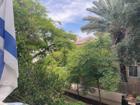

Feel free to send in any parenting questions you may have to parenting@ouisrael.org (Details will be changed to preserve anonymity).
Michal Silverstein has a MS in educational psychology and counseling. She facilitates parenting workshops in and around Jerusalem and maintains a private practice.










In this week’s parsha, Parshat Eikev, we read the second paragraph of the Shema. Shema calls us to “serve Hashem with all our heart” - םכבבל לכב ודבעלו. The Sifrei, raises an essential question about what it means to “serve” Hashem. He explains that this הדובע can refer to two distinct but interconnected practices: learning Torah and Tefillah. Both of these things, can be compared to the avodah that was performed on the חבזמ in the Beit HaMikdash.
Tefillah seems clear that it comes from the heart. However, at first glance, learning Torah might seem purely intellectual, a pursuit of the mind, the true הדובע of learning Torah, must engage not only the intellect but also the heart. Our study of Torah must be an emotional and spiritual one, bringing us closer to Hashem.
These תודובע should be like the הדובע of the חבזמ, where there was an דימת שא - a constant fire. This symbolizes that our connection to HaShem should be a constant fire.
In our הדובע through Torah learning and prayer, we must strive for the same consistency and passion as the constant flame. Our pursuit of closeness to Hashem should be fueled by a burning desire, a fire that inspires us to bring ourselves closer to
Hashem in every way possible. But this fire must also be sustained with consistency, a constant dedication to our avodah, even when we are not in shul or the beit midrash. They are not just for moments of active prayer or learning; they should permeate every aspect of our lives. We must carry this fire with us, viewing every moment as an opportunity to draw closer to Hashem.
B’ezrat Hashem, may our collective avodah, both intellectual and emotional, and our constant fire for HaShem bring us closer to the avodah of the Beit Hamikdash once again.

TEHILA LUXENBURG 10TH GRADE, BEIT SHEMESH CHAI GIRLS PARTICIPANT
In this week’s parsha, Eikev, we have the source for Birkat Hamazon, תאבשו תלכאו תכרבו. Rav Norman Lamm asks a question about Birkat Hamazon.
How come when we eat a fruit or even a grain we say a short bracha afterward but for bread we have to say a long Birkat Hamazon? For bread we have to work hard to prepare it and to be able to eat it there is a whole process unlike fruit that we pretty much just pick off a tree.
So why do we have to say the longest bracha afterward for something we already worked so hard to prepare? Shouldn’t it be the opposite?!
This is to teach us that when we pick a fruit we know that it is from Hashem we didn’t
Yishmael’s story is brief. He has numerous and powerful offspring. The brevity
Shabbat Shalom enumerated. Yishmael dies. His descendants dwell from Egypt to Assyria.
his son Shlomo succeed him.
have to do anything. But, since we worked so hard to make the bread, we could forget that Hashem is the one that provided us with the ingredients and to be able to make it. That so, we must make sure to really thank Hashem afterwards so we don’t forget.
Adoniyahu convinces two very significant personalities - the High Priest and the commander of King David’s armies - to
BY RABBI CHANOCH YERES R av, Beit Knesset Beit Yisrael, Yemin Moshe
When Avraham addresses the people of Cheit, trying to acquire a burial spot for his wife, he says “Ger V’Toshav Anochi Eimachem” (23:4) “A Stranger and a Resident am I with you”
A lesson we can take into our life from this that when we are doing something easy it is easier to thank Hashem. Yet, when something is more complicated, or we put in so much effort, we often forget it is still all from Hashem. We need to make sure to thank Hashem even if something is not so easy for us because everything is from Hashem!!
This seems to be a contradiction. If one is a stranger than he is not a resident, if he is a resident than he is no longer a stranger. What did Avraham mean?
The Magid of Dubno (Jacob ben Wolf Kranz 1741-1804) explains that Avraham watched how he spoke in this tense situation in order to, both, state his truth and be able to keep the peace -Shalom Bayit. Avraham said, on the one hand, “I am a Resident’ due to G-d’s promise to receive this Land and on the other hand, I still need your agreement to purchase a plot. In other words, Avraham implied “I am the resident” and you are the “strangers”, while they understood him as saying that “they” are the residents and Avraham is the stranger.
The peace was kept, and Avraham remained true to his ideals.
Good Shabbos!

ASSISTING THE NEEDY WHEREVER THEY ARE “Great is Tzedakah, for it brings the Redemption near” Sukkot 49b

THIS WEEK: Continuing to assist with a dental overhaul for an elderly, sick gentleman living off Bitu’ach Le’umi subsidy See What We Do and to Donate: www.Yeshezra.org
Bank transfer: Mercantile (17), Branch 642, A/C 79747843 Send Asmachta for tax receipt
Checks: “Yesh Ezra,” POB 31476, Romema, Jerusalem
Credit Card: Sara – 077-820-0196. Sun/Mon/Wed (10:15am-2.45 pm)
Inquiries: Menachem Persoff 050-570-1067 | menpmp@gmail.com

We are a young senior couple looking for a 1 bedroom furnished apartment in Jerusalem from December 2021-June 2022 0524419731

DON’T LET IT SNEAK UP ON YOU.
Make sure to drink 2.7 liters of water (11.5 cups) a day to stay hydrated in the hot Israeli summer.


Yaakov Mautner A resident at Ramat Tamir
Come visit the new garden apartments at Ramat Tamir's sheltered dwellings, Jerusalem, and enjoy delicious gourmet meals, a vibrant shul with shiurim all week, trips, lectures, a beauty parlor and the option of hosting family whenever you

